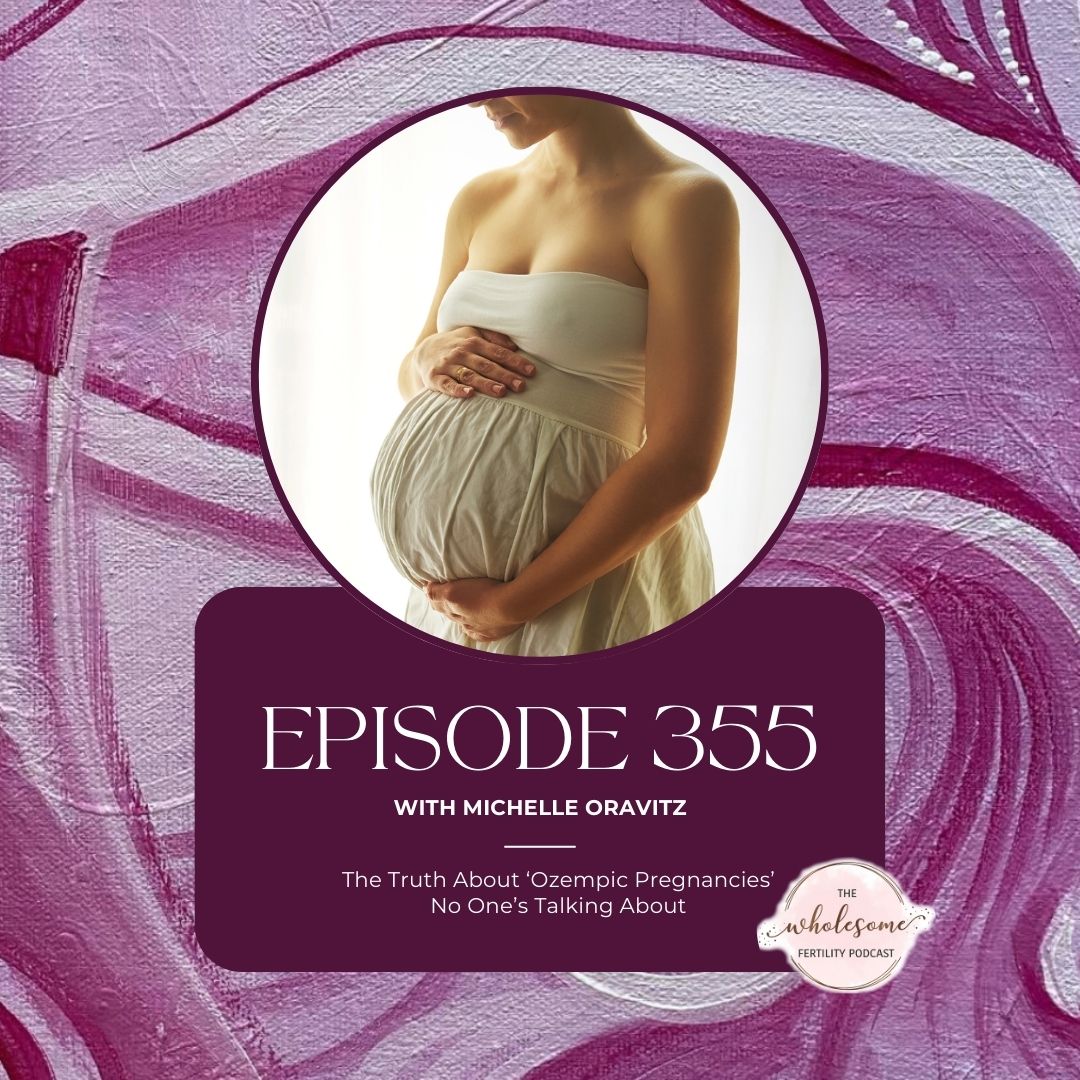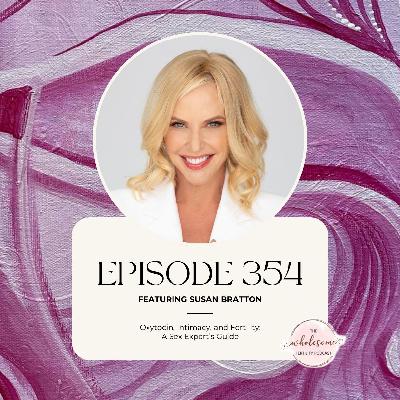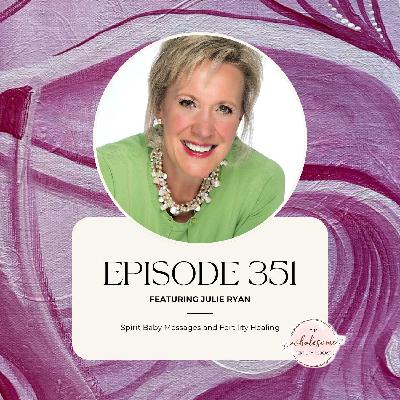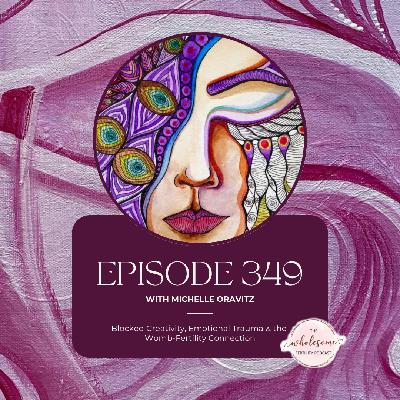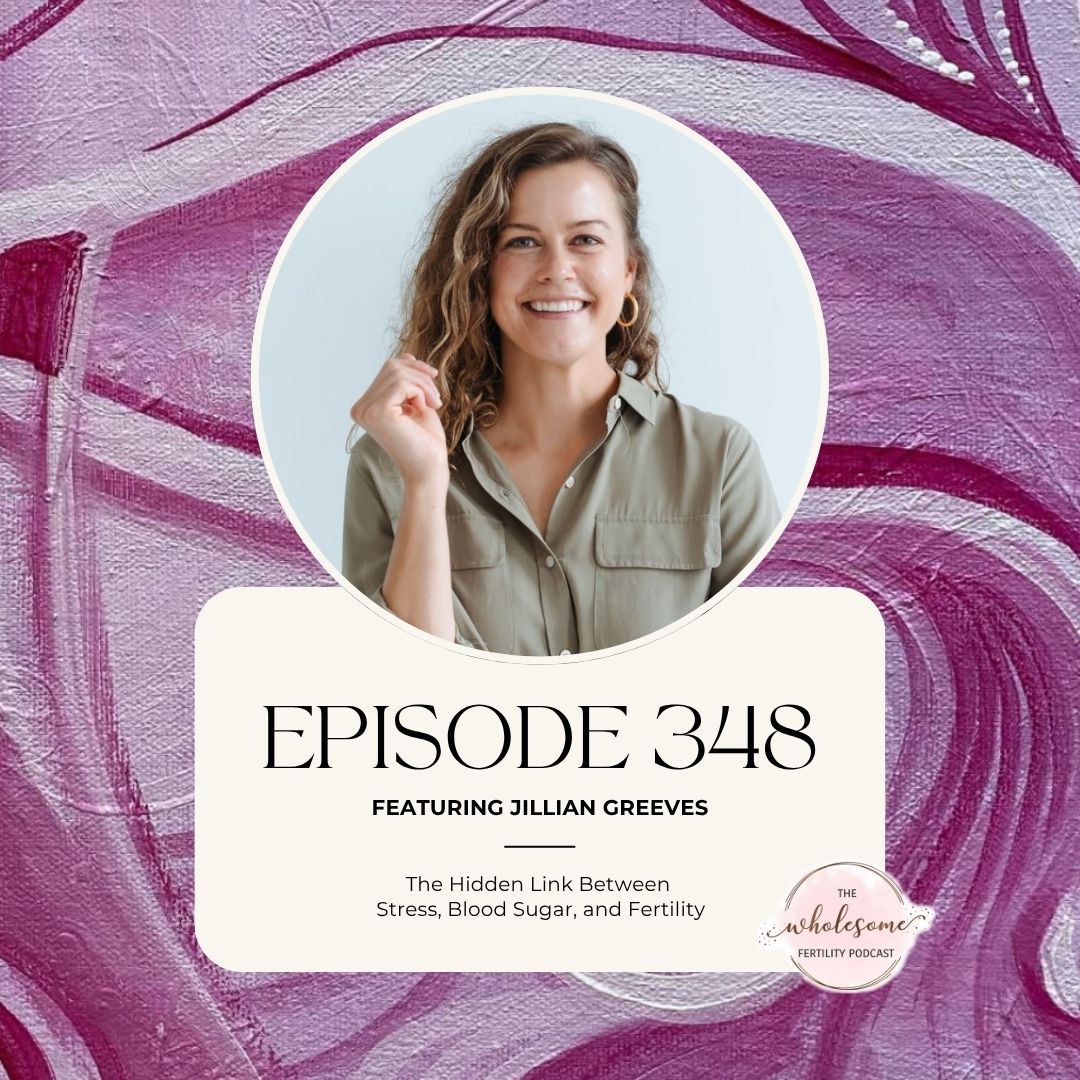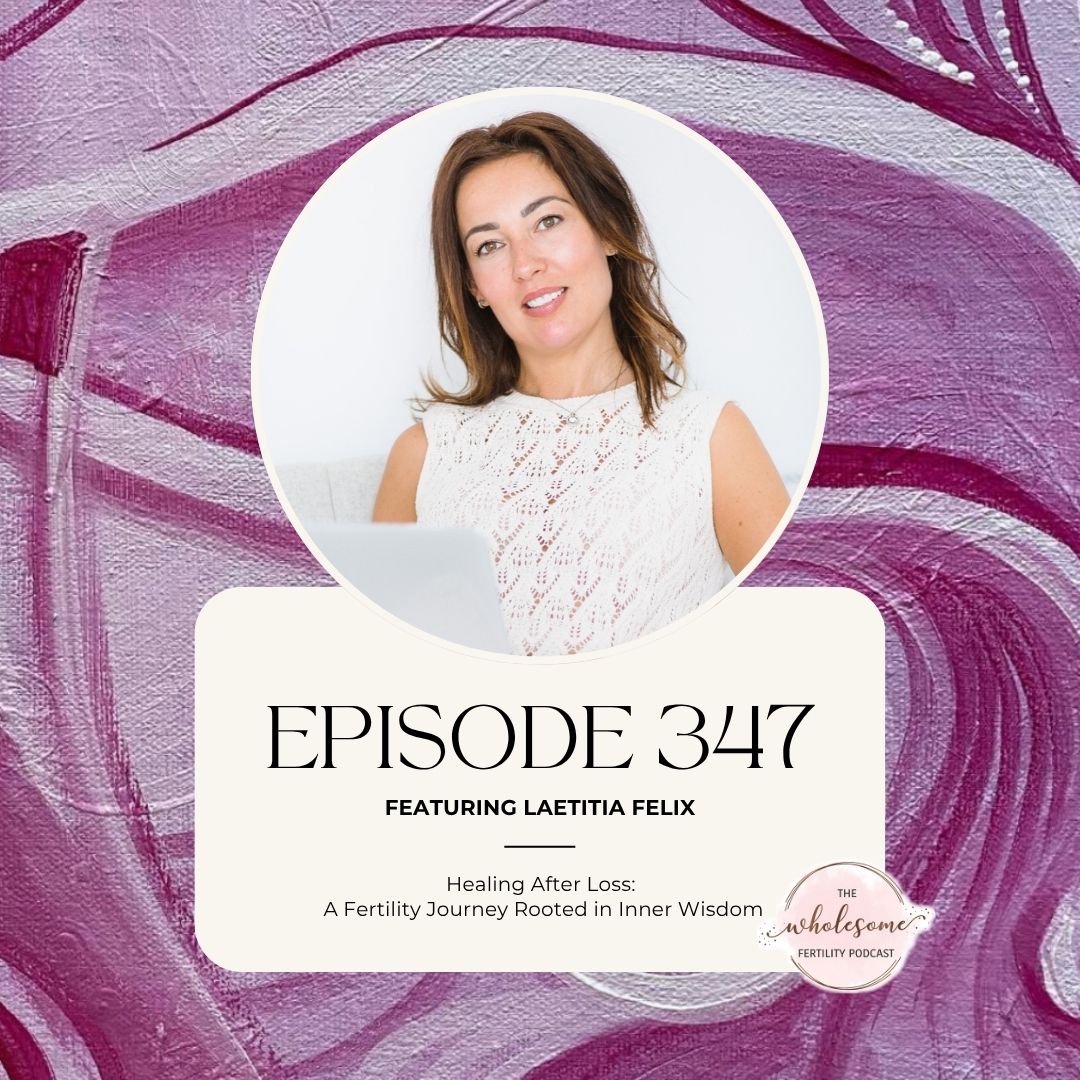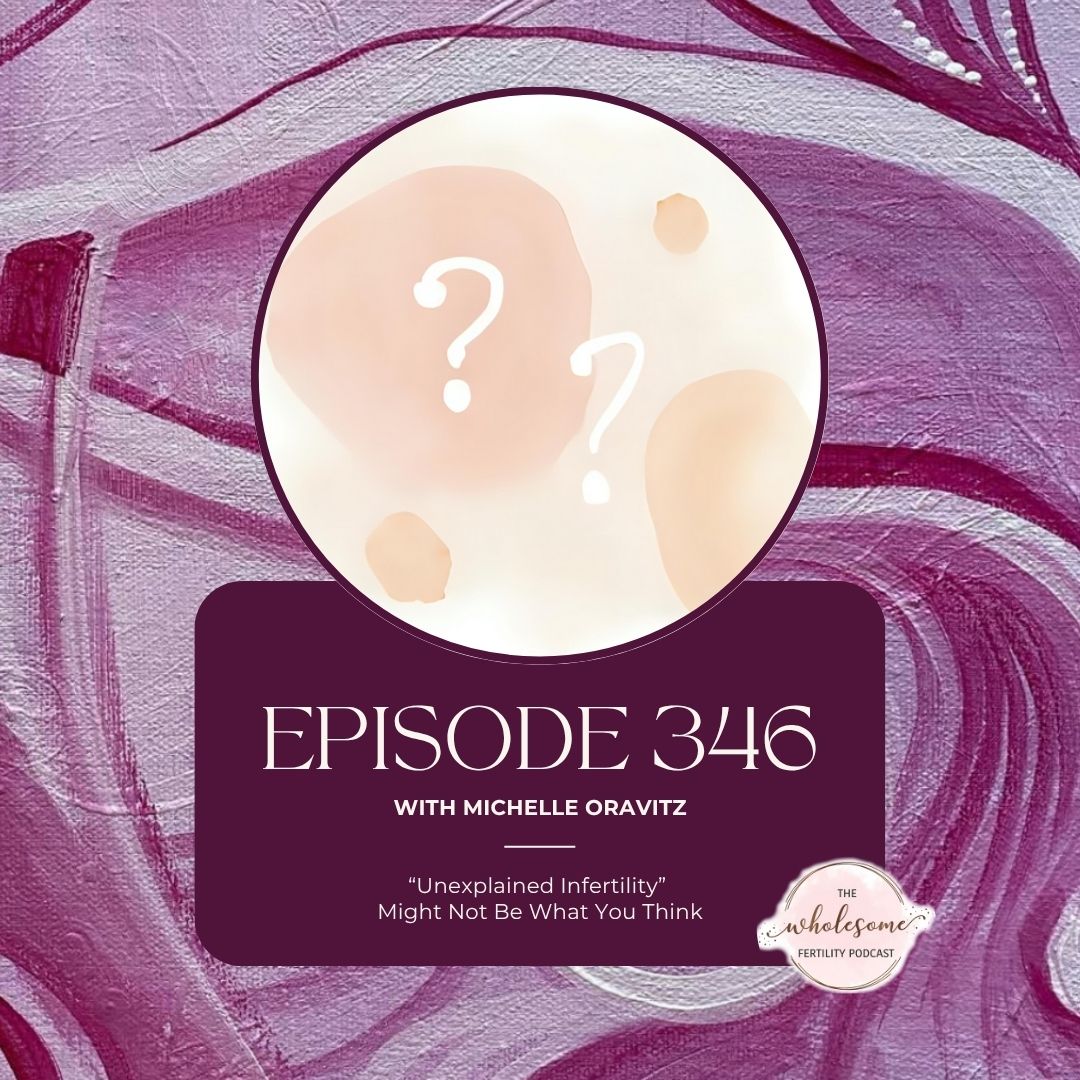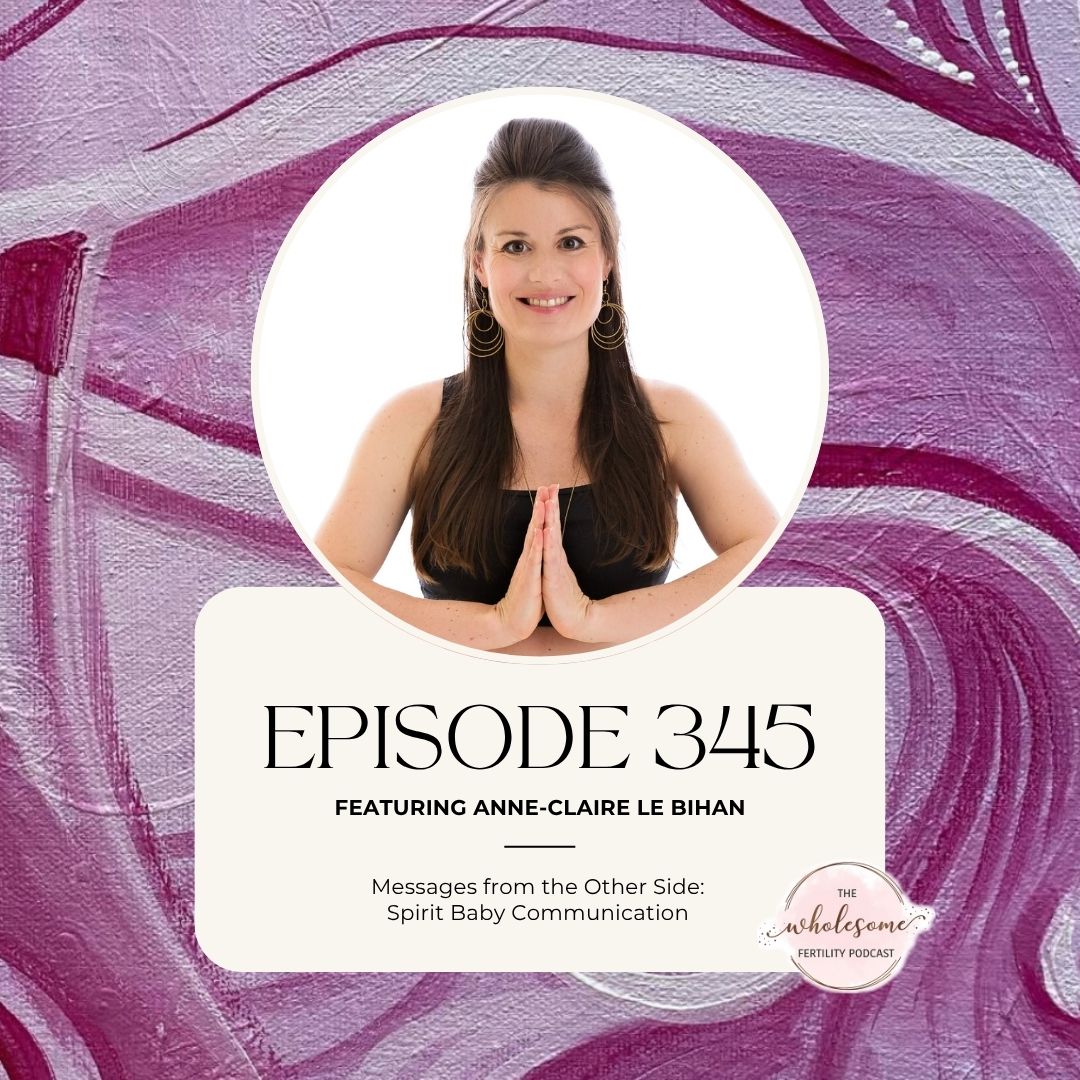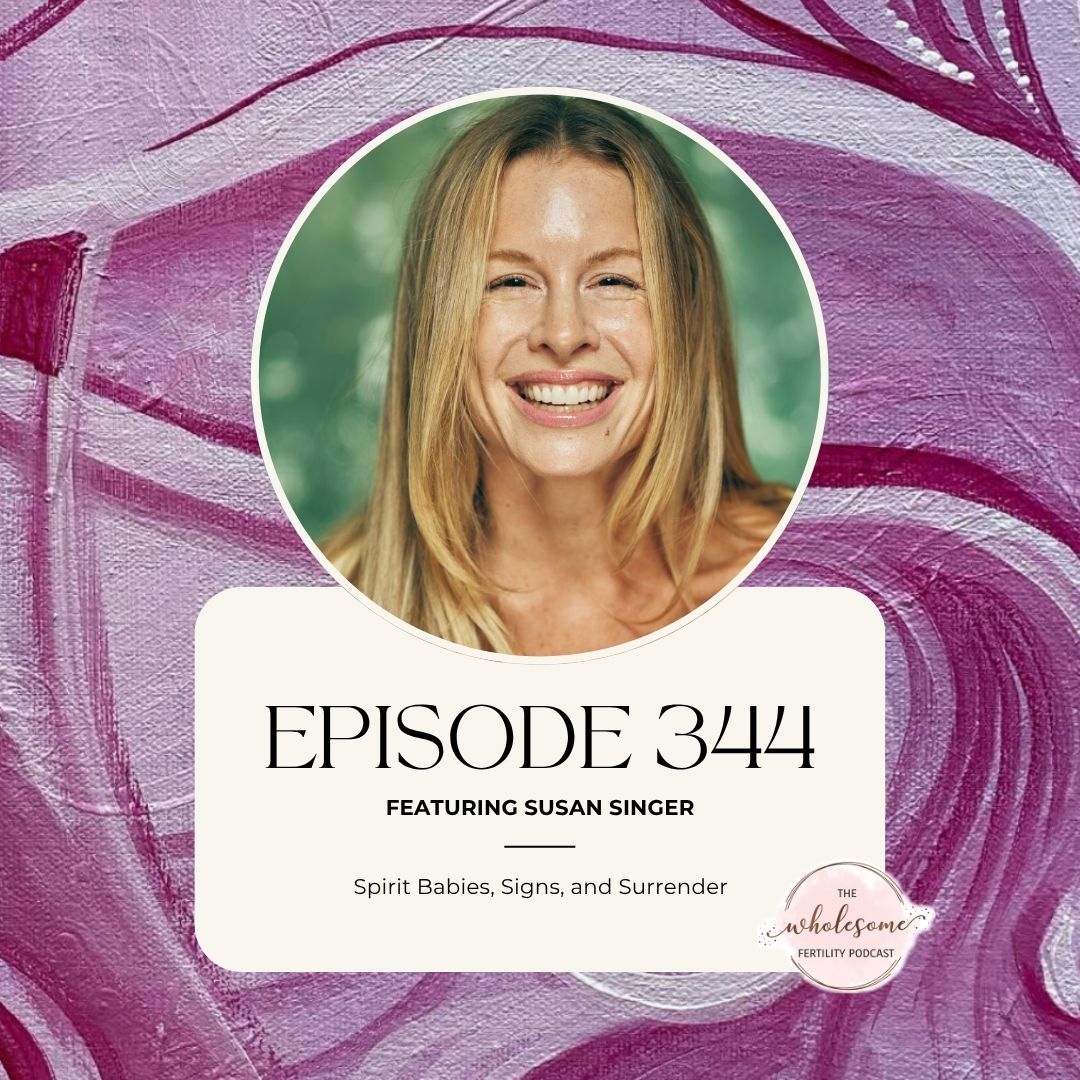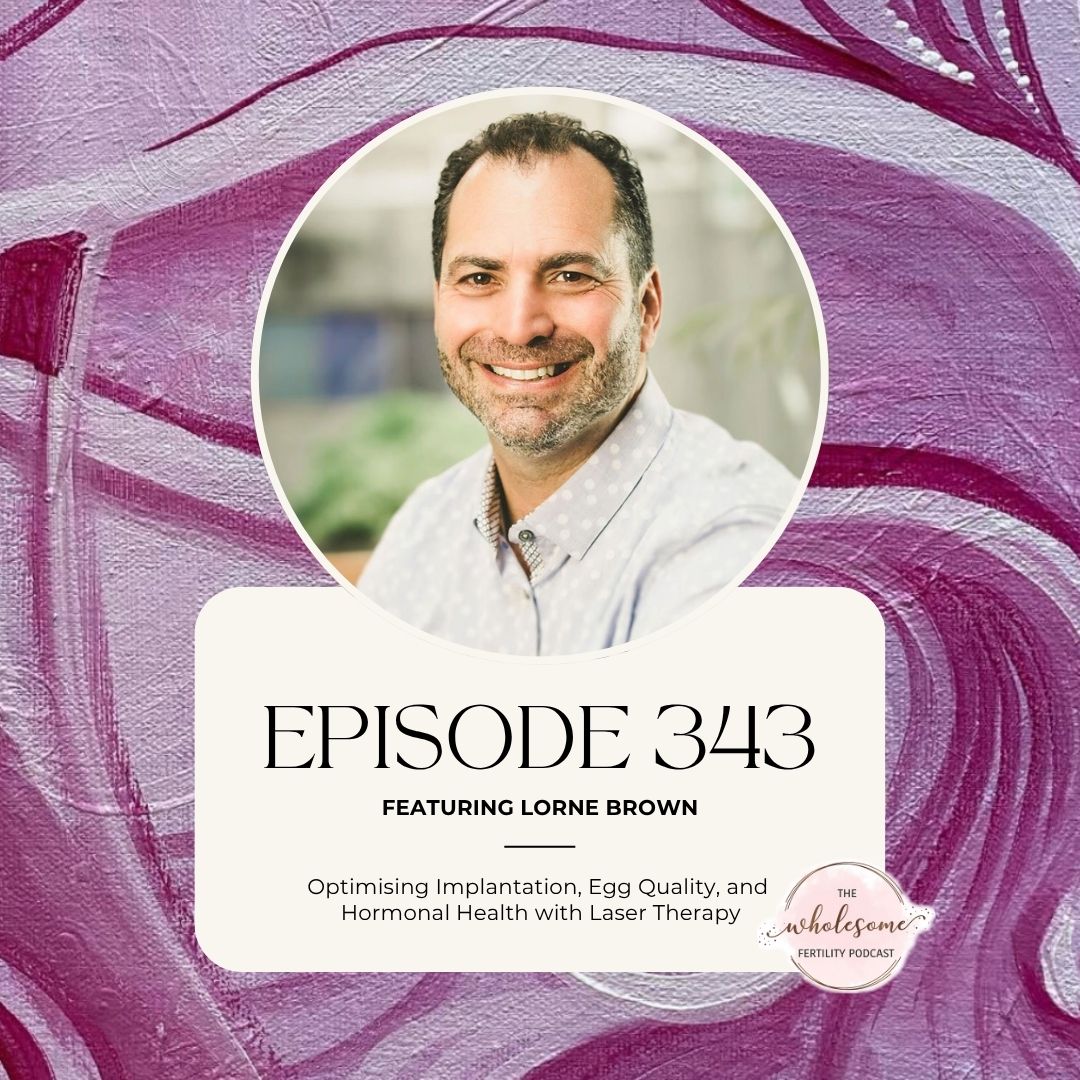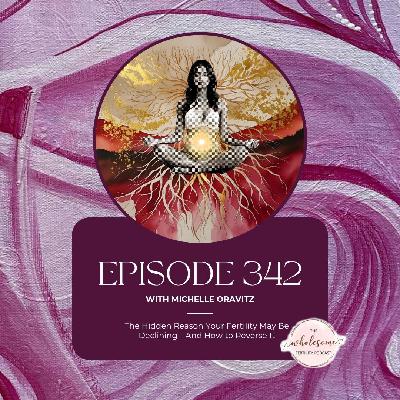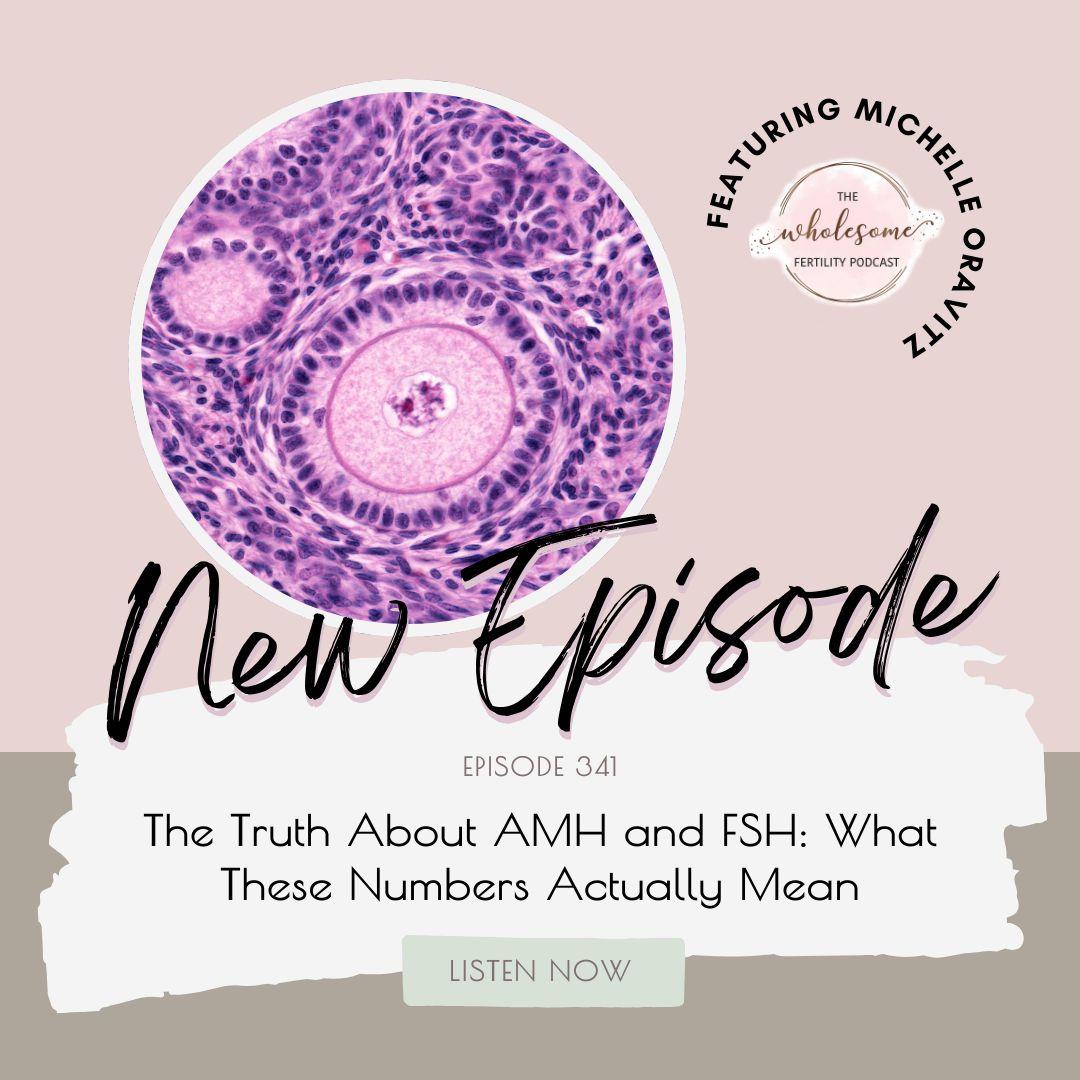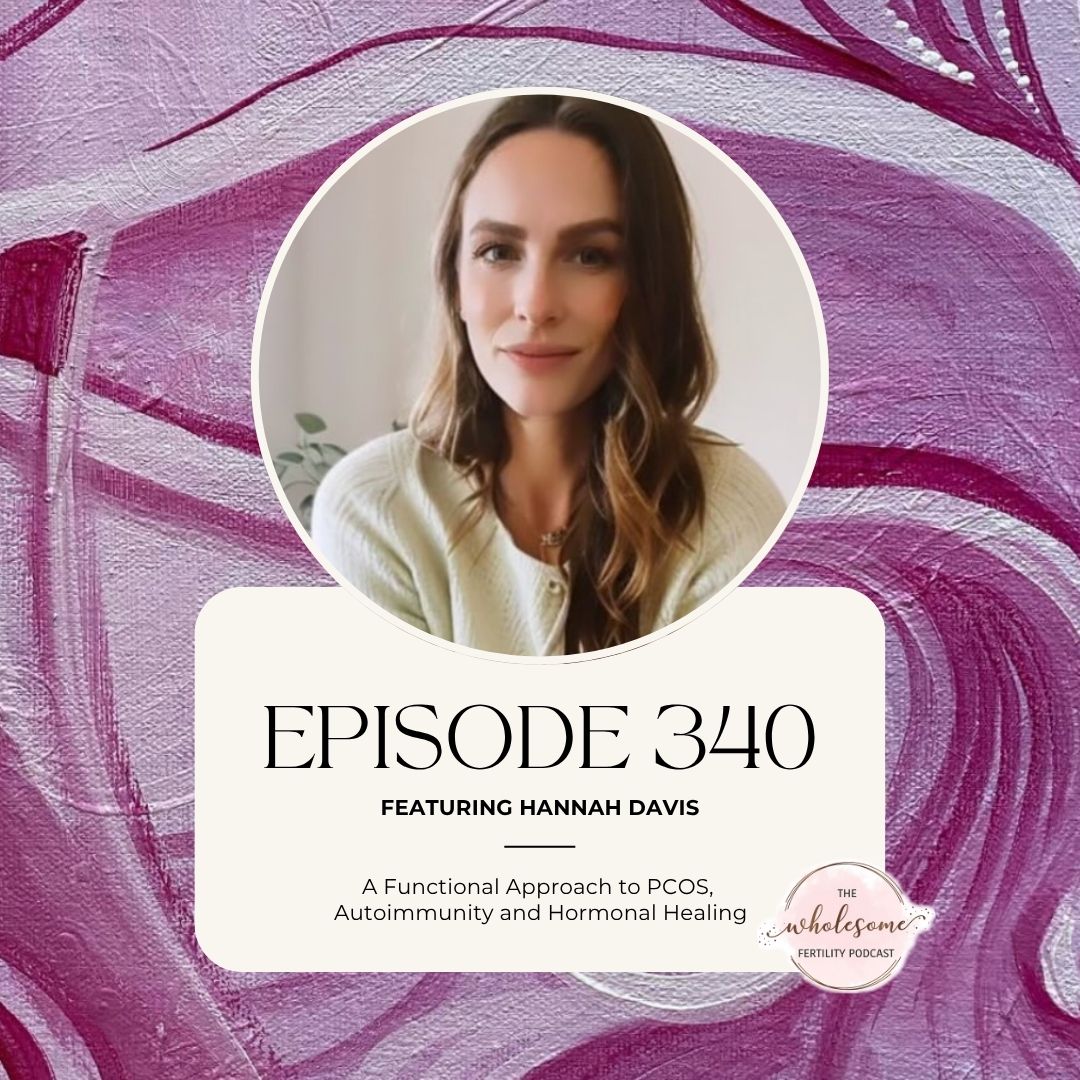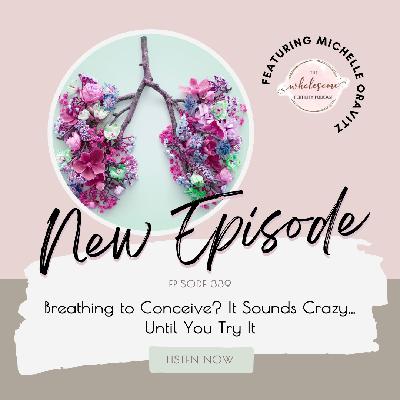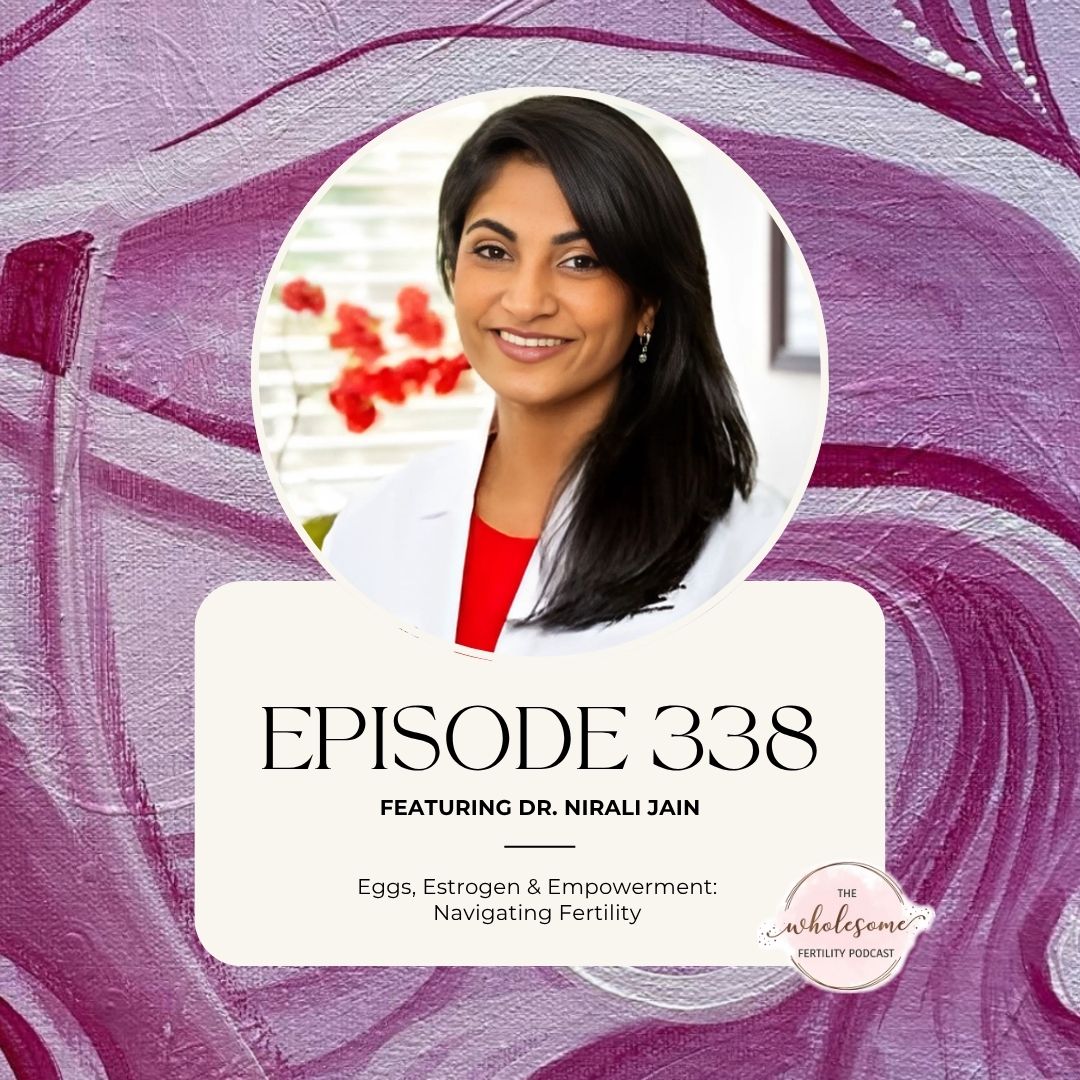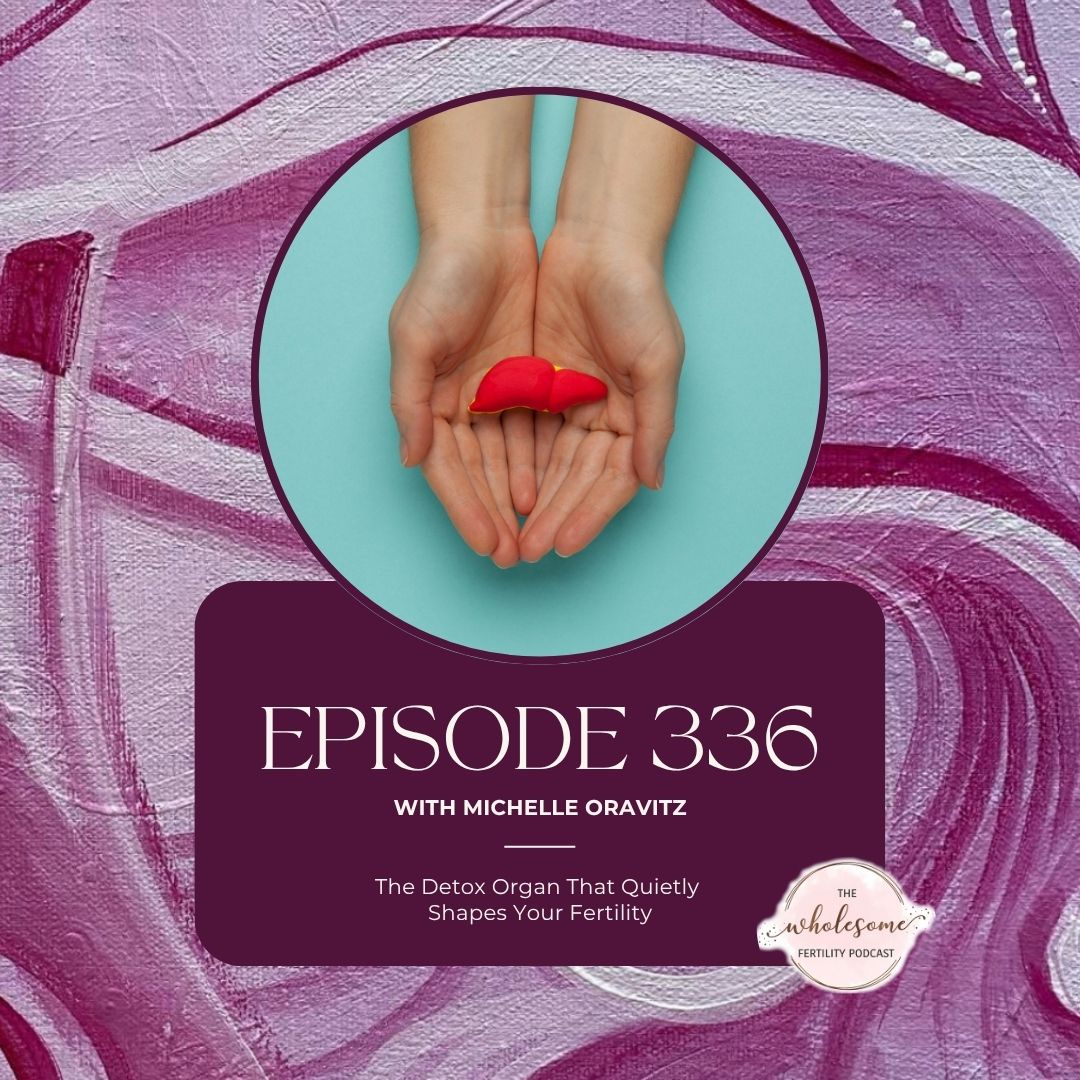Discover Wholesome Fertility Podcast
Wholesome Fertility Podcast

Wholesome Fertility Podcast
Author: Michelle | Fertility Wellness - Chinese Medicine, Acupuncture, Lifestyle
Subscribed: 242Played: 12,453Subscribe
Share
© The Wholesome Fertility
Description
The Wholesome Fertility Podcast is your trusted resource for empowering insights on the path to parenthood. Hosted by fertility acupuncturist and author Michelle Oravitz, this show blends modern science, holistic medicine, and ancient wisdom to help women optimize their fertility and reproductive health. Each week, Michelle shares solo episodes and interviews with leading fertility experts from around the world.
From improving egg quality and balancing hormones to navigating IVF, PCOS, and endometriosis, you’ll gain practical tools, research-backed strategies, and mind-body approaches to support your journey. Episodes explore topics like menstrual cycle optimization, Chinese medicine, functional medicine, naturopathic care, nutrition, meditation, and spirituality - offering multiple perspectives to help you reclaim your fertility and overall wellness.
If you’re ready to feel informed, supported, and inspired on your fertility journey, The Wholesome Fertility Podcast will give you the guidance you need to move forward with clarity and confidence.
From improving egg quality and balancing hormones to navigating IVF, PCOS, and endometriosis, you’ll gain practical tools, research-backed strategies, and mind-body approaches to support your journey. Episodes explore topics like menstrual cycle optimization, Chinese medicine, functional medicine, naturopathic care, nutrition, meditation, and spirituality - offering multiple perspectives to help you reclaim your fertility and overall wellness.
If you’re ready to feel informed, supported, and inspired on your fertility journey, The Wholesome Fertility Podcast will give you the guidance you need to move forward with clarity and confidence.
355 Episodes
Reverse
In today’s episode, I dive into the rising phenomenon of so-called “Ozempic pregnancies” and uncover what’s really happening behind the headlines. GLP-1 receptor agonists like Ozempic and Wegovy were originally developed for type 2 diabetes, but are now being used by many women with PCOS, insulin resistance, or weight challenges to support fertility. I’ll break down how these medications work, why they may help some women conceive, and the important risks and limitations you need to know. From a Traditional Chinese Medicine (TCM) perspective, we’ll explore why simply taking a drug isn’t enough to address the root cause, and how digestive health, spleen qi, and lifestyle habits hold the key to lasting fertility and hormone balance. I’ll also share practical strategies you can start today, like mindful eating, warming your digestive fire, and syncing with your circadian rhythm, that can naturally support your fertility journey. Key Takeaways: GLP-1 medications like Ozempic can temporarily improve insulin sensitivity but don’t resolve the root causes of infertility. Insulin resistance impacts ovulation, egg quality, and hormone balance, especially in women with PCOS. TCM approaches fertility by strengthening the digestive system and restoring balance, rather than suppressing symptoms. Mindful eating, warm digestion-supporting practices, and aligning meals with the body’s circadian rhythm are powerful fertility boosters. Sustainable lifestyle changes are essential for lasting fertility health, beyond short-term medication use. Links mentioned: 📕Fertility Diet eBook—------------------------------------------------ For more information about Michelle, visit www.michelleoravitz.com Take the quiz and start your journey here: https://www.michelleoravitz.com/the-wholesome-fertility-journey To learn more about ancient wisdom and fertility, you can get Michelle’s book at: https://www.michelleoravitz.com/thewayoffertility The Wholesome Fertility facebook group is where you can find free resources and support: https://www.facebook.com/groups/2149554308396504/ Instagram: @thewholesomelotusfertility Facebook: https://www.facebook.com/thewholesomelotus/
On this episode of The Wholesome Fertility Podcast, I am joined by intimacy expert and author Susan Bratton (@susanbratton) to explore the powerful connection between passion, pleasure, and fertility. Too often, trying to conceive becomes mechanical and stressful, leaving intimacy feeling like a chore. Susan brings her 20+ years of experience helping couples transform “having sex” into “making love” and shares practical tools to reignite joy and connection on the fertility journey. We dive into her three keys to conception, relaxation, connection, and engorgement, and how practices like yoni massage, oxytocin-boosting foods, and conscious lovemaking can not only increase the chances of conceiving but also create a more vibrant and lasting intimacy. Susan also shares insights on male performance challenges, natural fertility-friendly products, and why cultivating oxytocin can be life-changing for both partners. If you’ve been feeling like intimacy has become all about the baby-making schedule, this episode will give you a refreshing and empowering perspective on bringing back the romance and planting the seeds for a lifetime of passion. Key Takeaways: Why fertility often makes intimacy feel mechanical and how to shift that. The three keys to conception from a sex expert’s perspective: relaxation, connection, and engorgement. How yoni massage and nitric oxide support female arousal and fertility. Oxytocin’s overlooked role in conception, joy, and long-term intimacy. Practical tools to reduce stress, reignite pleasure, and support both partners through TTC. Guest Bio: Susan Bratton (@susanbratton), widely known as the “Intimacy Expert to Millions,” is a champion for lifelong passion and connection. She is the co-founder of Personal Life Media, creator of the Better Lover brand, and CEO of The20, a company producing organic and botanical supplements to support vitality. A best-selling author of over 40 books and programs, including Relationship Magic and Revive Her Drive, Susan has been featured on ABC, CBS, NBC, and is one of the most downloaded guests on countless podcasts worldwide. Connect with Susan: Visit her websiteFollow her on FacebookFollow her on InstagramWatch her videos in YoutubeGet your free bottle here! —------------------------------------------------ For more information about Michelle, visit www.michelleoravitz.com Take the quiz and start your journey here: https://www.michelleoravitz.com/the-wholesome-fertility-journey To learn more about ancient wisdom and fertility, you can get Michelle’s book at: https://www.michelleoravitz.com/thewayoffertility The Wholesome Fertility facebook group is where you can find free resources and support: https://www.facebook.com/groups/2149554308396504/ Instagram: @thewholesomelotusfertility Facebook: https://www.facebook.com/thewholesomelotus/ Disclaimer: The information shared on this podcast is for educational and informational purposes only and is not intended as medical advice. Please consult with your healthcare provider before making any changes to your health or fertility care.
In this episode of The Wholesome Fertility Podcast, I’m sharing my personal experience attending my fourth week-long Joe Dispenza retreat. From spontaneous moments of connection with the quantum field to powerful coherence healing experiences, I’ll walk you through what actually happens at these retreats and how Dr. Joe blends science and spirituality to help people transform and heal. I’ll also share the unexpected manifestation that left me speechless… and how I’ve started writing affirmations into thin air (yes, really!). Whether you're on a healing journey, exploring meditation, or just curious about how your mind shapes your reality, this episode is filled with practical inspiration, quantum insights, and deep personal reflection. Key Takeaways: What it’s really like to attend a Joe Dispenza week-long retreat (and why they sell out so quickly How Dr. Joe bridges quantum physics, neuroscience, and ancient wisdom The science behind the breathwork technique that activates the pineal gland Why becoming “nothing” during meditation is actually the path to transformation A real-life manifestation story involving a wild yellow flower The role of coherence healing and how it’s helping people shift physically and emotionally How letting go of control is key—especially on the fertility journey A simple technique to encode intentions using your finger in the air (yes, it works!) Why you don’t have to attend a retreat to benefit from the work __________________________________________________________ For more information about Michelle, visit www.michelleoravitz.com Take the quiz and start your journey here: https://www.michelleoravitz.com/the-wholesome-fertility-journey To learn more about ancient wisdom and fertility, you can get Michelle’s book at: https://www.michelleoravitz.com/thewayoffertility The Wholesome Fertility facebook group is where you can find free resources and support: https://www.facebook.com/groups/2149554308396504/ Instagram: @thewholesomelotusfertility Facebook: https://www.facebook.com/thewholesomelotus/
On today’s episode of The Wholesome Fertility Podcast, I’m joined by Brooke Harmer (@thewellnourishedmama_), the founder of The Well Nourished Mama, a nutritionist and postpartum health expert who supports women through pregnancy, postpartum, and beyond. Brooke’s journey began as a food blogger helping college students eat well on a budget, but after becoming a mother herself, she shifted her focus to helping women heal nutritionally after birth and prepare their bodies for future pregnancies. In this conversation, we explore how pregnancy, birth, and postpartum dramatically shift a woman’s biochemistry, gut microbiome, and hormonal balance, and why many women facing secondary infertility are actually experiencing a deep nutritional depletion. Brooke shares the foundational habits and healing foods that help rebuild nutrient stores and support fertility, whether it’s your first or third time trying to conceive. From bone broth and Brazil nuts to the power of minerals and full-fat dairy, this episode is packed with essential advice for replenishing the body and preparing for a thriving pregnancy. 🎧 Tune in if you’re navigating secondary infertility, prepping for conception after baby, or simply want to learn how to nourish your body through all seasons of motherhood. Key Takeaways: - Postpartum depletion can significantly impact future fertility. - The body undergoes major gut, immune, and hormonal shifts during pregnancy and childbirth. - Healing takes time, more than the traditional 6 weeks postpartum. - Eating 3 well-balanced meals a day is foundational for hormone and fertility health. - Minerals and full-fat foods are essential for restoring the body’s cellular function and hormonal balance. Guest Bio: Brooke Harmer (@thewellnourishedmama_), is a certified perinatal nutritionist who empowers women to take a proactive, holistic approach to their health during pregnancy and postpartum. Blending evidence-based science with ancient nutritional wisdom, Brooke supports women in nourishing their bodies, working in sync with their medical providers, and thriving through every stage of motherhood. She’s the author of two best-selling cookbooks and the host of The Well Nourished Mama Podcast, a top 50 show that has become a go-to resource in the mama community for practical, grounded wellness guidance. Learn more about Brooke: Visit her website here —--------------------------- For more information about Michelle, visit www.michelleoravitz.com Take the quiz and start your journey here: https://www.michelleoravitz.com/the-wholesome-fertility-journey To learn more about ancient wisdom and fertility, you can get Michelle’s book at: https://www.michelleoravitz.com/thewayoffertility The Wholesome Fertility facebook group is where you can find free resources and support: https://www.facebook.com/groups/2149554308396504/ Instagram: @thewholesomelotusfertility Facebook: https://www.facebook.com/thewholesomelotus/
In this episode of The Wholesome Fertility Podcast, psychic, medium, and medical intuitive Julie Ryan (@askjulieryan) returns to share her extraordinary “buffet of psychicness.” Julie has a rare ability to scan the body, facilitate energetic healings, and connect with spirits, including those of future children. You’ll hear a live fertility reading for one of my clients, where Julie uncovers energetic insights, identifies physical and emotional blocks, and even connects with two spirit babies waiting to join the family. We explore the body’s innate ability to heal, the role of mindset and nervous system regulation in fertility, and how to navigate the often overwhelming medical side of the journey. Julie also teaches her simple yet powerful “Two-Minute Rule” for reducing stress instantly, shares her process for regenerating energetic blueprints, and reminds us that healing is always possible. Whether you’re seeking answers, hope, or a deeper spiritual connection on your fertility path, this conversation offers both comfort and empowerment. Key Takeaways: The body has an innate ability to heal itself, healers and practitioners facilitate the process, but true healing comes from within. Spirit babies can attach to a mother’s energy field long before conception, offering reassurance and hope on the fertility journey. Shifting out of fear and stress is crucial, as the body enters creation mode—not survival mode, when it feels safe and calm. The “Two-Minute Rule” is a simple tool to quickly identify irrational fears and keep stress and inflammation levels low. Energetic healing can address both physical and emotional blocks, supporting reproductive health alongside conventional care. Guest Bio: Julie Ryan is a psychic medium and medical intuitive with the ability to sense medical conditions, facilitate energetic healings, and communicate with spirits, both living and deceased. Known as a “buffet of psychicness™,” she can scan animals, access past lives, and even gauge how close someone is to passing. Julie is the author of Angelic Attendants and the Angel Messages® children’s books, and hosts the popular Ask Julie Ryan show, heard in over 100 countries. A businesswoman, inventor, and serial entrepreneur, she has founded nine companies across five industries and holds patents for surgical devices sold worldwide. Learn more about Julie Ryan: Visit her website hereFollow her on: Instagram, Facebook and LinkedInWatch her on Youtube —--------------------------- For more information about Michelle, visit www.michelleoravitz.com Take the quiz and start your journey here: https://www.michelleoravitz.com/the-wholesome-fertility-journey To learn more about ancient wisdom and fertility, you can get Michelle’s book at: https://www.michelleoravitz.com/thewayoffertility The Wholesome Fertility facebook group is where you can find free resources and support: https://www.facebook.com/groups/2149554308396504/ Instagram: @thewholesomelotusfertility Facebook: https://www.facebook.com/thewholesomelotus/
On today’s solo episode of The Wholesome Fertility Podcast, I explore the often-misunderstood world of manifestation, especially as it relates to trying to conceive. If you’ve ever felt guilty for having negative thoughts or wondered whether your mindset is blocking your fertility, this episode is for you. I break down the energetic and physical layers of manifestation, share how flow state and nervous system regulation impact your ability to create (including fertility), and offer actionable tips for integrating mindset work in a way that supports, not overwhelms, your journey. From ancient wisdom to real-life stories (including how I manifested my dream job and meeting my husband), I share how true manifestation stems from a state of ease, alignment, and wholeness. Key Takeaways: Manifestation is not about toxic positivity or blaming yourself for your fertility journey Flow state, deep presence and openness, is the true foundation of creation Fertility is an extension of the body’s creative energy and should be supported holistically Validation of your emotions is essential, resisting them leads to stagnation Aligning body and mind through practices like meditation, journaling, and joy-based activities can help shift your energetic state Affirmations work best when they feel safe, believable, and rooted in gratitude Links and Resources: Flow: The Psychology of Optimal Experience by Mihaly Csikszentmihalyi\ The Power of Your Subconscious Mind by Joseph Murphy If you’re curious about how to quiet your mind and gently support your body with mindset tools, my Rooted Membership is designed for you. It’s a space where I share hypnosis audios, meditations, and mindset practices to bring calm to your fertility journey. You can even try it free for 7 days and see how it feels. https://www.michelleoravitz.com/rooted-fertility-mindset-membership ______________________ For more information about Michelle, visit www.michelleoravitz.com Take the quiz and start your journey here: https://www.michelleoravitz.com/the-wholesome-fertility-journey To learn more about ancient wisdom and fertility, you can get Michelle’s book at: https://www.michelleoravitz.com/thewayoffertility The Wholesome Fertility facebook group is where you can find free resources and support: https://www.facebook.com/groups/2149554308396504/ Instagram: @thewholesomelotusfertility Facebook: https://www.facebook.com/thewholesomelotus/
On this powerful solo episode of The Wholesome Fertility Podcast, I explore the deep connection between blocked creativity, emotional trauma, and the womb—and how this interplay can directly affect your fertility. While so many focus on ovulation tracking, supplements, and diet, it’s often the unspoken, unprocessed emotions that quietly influence conception. In this episode, I share the wisdom of ancient traditions and modern science, revealing how the womb is not just a physical organ but an energetic, emotional, and creative center. From Chinese medicine’s heart-womb connection to somatic healing practices like visualization and movement, I offer actionable ways to reconnect with your womb and unlock its healing potential. Whether you're trying to conceive or simply seeking a deeper relationship with your body, this episode will invite you to listen inward, release what’s been stored, and restore safety and softness to the womb space. Key Takeaways: How trauma, grief, and emotional blocks can be stored in the womb The ancient and energetic significance of the womb as a creative center How the heart and uterus are connected through Chinese medicine Practices to restore safety and regulation in the nervous system Simple tools like visualization, movement, and self-compassion to nurture the womb For more information about Michelle, visit www.michelleoravitz.com Take the quiz and start your journey here: https://www.michelleoravitz.com/the-wholesome-fertility-journey To learn more about ancient wisdom and fertility, you can get Michelle’s book at: https://www.michelleoravitz.com/thewayoffertility The Wholesome Fertility facebook group is where you can find free resources and support: https://www.facebook.com/groups/2149554308396504 Instagram: @thewholesomelotusfertility Facebook: https://www.facebook.com/thewholesomelotus/ Disclaimer: The information shared on this podcast is for educational and informational purposes only and is not intended as medical advice. Please consult with your healthcare provider before making any changes to your health or fertility care.
On today’s episode of The Wholesome Fertility Podcast, I’m joined by Jillian Greaves @jilliangreavesrd, a functional medicine dietitian and women’s health expert, to unpack the complex but often overlooked, relationship between blood sugar balance, hormonal birth control, and fertility. Jillian shares her personal health journey from battling persistent symptoms like acne, bloating, anxiety, and hair loss to uncovering the deeper root causes through functional medicine. We dive into how hormonal birth control impacts your hormones, gut, liver, and micronutrient status, and why so many women feel worse when coming off the pill. Jillian also breaks down why managing blood sugar is essential not only for hormone balance but also for egg quality, ovulation, and creating safety in the body. Whether you're navigating post-birth control symptoms, thinking about conception, or simply curious about how nutrition and nervous system regulation influence your cycle, this episode is packed with insights that will leave you feeling empowered and informed. Key Takeaways: Hormonal birth control suppresses your natural hormone cycle and can lead to long-term nutrient depletion, gut imbalance, and inflammation. Coming off the pill is often a bumpy process that requires patience, support, and targeted care. Balanced blood sugar is the foundation of hormonal health and fertility—swings in either direction can create stress signals in the body. Fasting and trendy diets like intermittent fasting may backfire for women, especially those trying to conceive. Nutrition is powerful, but blood sugar regulation also depends on stress management, sleep, and circadian rhythm alignment. Guest Bio: Jillian Greaves @jilliangreavesrd is a functional medicine dietitian and women's health expert who helps women address the root causes of hormonal imbalances, period problems, and fertility challenges. After facing years of frustrating symptoms and inadequate answers from conventional care, Jillian turned to functional medicine to heal her own body and now supports others through a personalized, evidence-based approach. She offers private coaching, advanced lab testing, and practical guidance to help women feel empowered in their health journeys. Links and Resources: Visit Jillian’s Instagram Book a free discovery call via her website For more information about Michelle, visit www.michelleoravitz.com To learn more about ancient wisdom and fertility, you can get Michelle’s book at: https://www.michelleoravitz.com/thewayoffertility The Wholesome Fertility facebook group is where you can find free resources and support: https://www.facebook.com/groups/2149554308396504/ Instagram: @thewholesomelotusfertility Facebook: https://www.facebook.com/thewholesomelotus/ Disclaimer: The information shared on this podcast is for educational and informational purposes only and is not intended as medical advice. Please consult with your healthcare provider before making any changes to your health or fertility care.
On today’s episode of The Wholesome Fertility Podcast, I am joined by Laetitia Felix @mindset_bodyandsoul, a fertility mindset coach who shares her deeply personal and powerful journey through infertility, loss, and ultimately conception. After experiencing three ectopic pregnancies and an early miscarriage, Leatitia was told IVF was her only option—but she knew in her heart there was another path. In this vulnerable conversation, she opens up about how slowing down, healing her nervous system, and connecting to her spiritual self helped her conceive naturally—against the odds and through the same fallopian tube doctors advised removing. We also explore spirit baby communication, the emotional toll of unexplained infertility, and how reclaiming your inner wisdom can be the most radical act of self-love. This episode is an invitation to stop, listen, and trust the messages your body and spirit may already be sending you. Key Takeaways: Laetitia Felix conceived naturally after three ectopic pregnancies and an early loss—through the same tube doctors recommended removing. IVF was presented as her only option, but she chose to explore inner healing and spiritual connection instead. Emotional processing, mindset work, and womb healing played a major role in restoring her health and fertility. Connecting with her spirit baby gave her reassurance, peace, and a sense of divine timing. Fertility healing isn’t one-size-fits-all—trusting your intuition and calming the nervous system are foundational. Guest Bio: Laetitia Felix @mindset_bodyandsoul is a certified Fertility Mindset Coach based in London, originally from France. After navigating her own challenging path to motherhood—including multiple pregnancy losses—she now supports women on similar journeys through her holistic Mind, Body, and Soul approach. Laetitia helps women process emotional trauma, release both conscious and unconscious blocks, and reconnect with their inner wisdom to prepare for conception. Deeply passionate about this work, she brings compassion, lived experience, and powerful tools to guide women—whether they’re just starting out or healing after loss. Links and Resources: Visit Laetitia’s Instagram Book a free discovery call via her website For more information about Michelle, visit www.michelleoravitz.com To learn more about ancient wisdom and fertility, you can get Michelle’s book at: https://www.michelleoravitz.com/thewayoffertility The Wholesome Fertility facebook group is where you can find free resources and support: https://www.facebook.com/groups/2149554308396504/ Instagram: @thewholesomelotusfertility Facebook: https://www.facebook.com/thewholesomelotus/ Disclaimer: The information shared on this podcast is for educational and informational purposes only and is not intended as medical advice. Please consult with your healthcare provider before making any changes to your health or fertility care.
On today’s episode of The Wholesome Fertility Podcast, I dive deep into the topic of unexplained infertility—a term often given when standard fertility tests show “normal” results, yet conception still isn’t happening. I share how Traditional Chinese Medicine (TCM), functional testing, and a deeper mind-body approach can offer clarity where conventional medicine falls short. We’ll explore key overlooked areas such as egg and sperm quality, thyroid health, gut imbalances, endocrine disruptors, and the vital role of nervous system regulation. Whether you’re newly diagnosed or years into your fertility journey, this episode will empower you with insights that go far beyond the typical lab work. Key Takeaways: TCM can detect subtle imbalances long before they appear in clinical tests. Factors like egg quality, sperm DNA fragmentation, endometrial inflammation, and thyroid health are frequently missed. Nervous system regulation and stress support are essential but often overlooked in fertility care. Gut health and exposure to endocrine disruptors significantly impact hormonal and reproductive function. ------------------ For more information about Michelle, visit www.michelleoravitz.com To learn more about ancient wisdom and fertility, you can get Michelle’s book at: https://www.michelleoravitz.com/thewayoffertility The Wholesome Fertility facebook group is where you can find free resources and support: https://www.facebook.com/groups/2149554308396504/ Instagram: @thewholesomelotusfertility Facebook: https://www.facebook.com/thewholesomelotus/ Disclaimer: The information shared on this podcast is for educational and informational purposes only and is not intended as medical advice. Please consult with your healthcare provider before making any changes to your health or fertility care.
On today’s episode of The Wholesome Fertility Podcast, I am joined by spirit baby medium Anne-Claire Le Bihan @anneclairelebihan, who guides women in connecting with the souls of their future children. With a background in midwifery and naturopathy, Anne-Claire shares how her own pregnancy journey awakened her intuitive abilities and led her to support women experiencing unexplained infertility. Together, we dive into the messages spirit babies want to share, why they might delay incarnating, and how making space emotionally, spiritually, and even physicalyl, can open the path to conception. Anne-Claire offers practical tools for tuning into these messages, from meditation and journaling to setting intentions before sleep. Whether you're struggling to conceive, feeling called to connect spiritually with your future child, or simply open to a deeper perspective on fertility, this episode offers a beautiful blend of soul, surrender, and hope. Key Takeaways: Making space—mentally, emotionally, and physically—is essential for welcoming in new life. Guest Bio: Anne-Claire Le Bihan @anneclairelebihan is a Spirit Baby Medium and Spiritual Fertility Guide who has helped hundreds of women around the world connect with their Spirit Babies and bring their dreams of motherhood to life. Through her Bring Your Spirit Baby Home program, private sessions, and meditations, Anne-Claire guides women to clear emotional and energetic blocks, deepen their trust, and align their body, mind, and spirit for conception. Blending intuition with grounded spiritual tools, her mission is to empower women to feel supported, connected, and truly held on their journey to motherhood. Links and Resources: Follow Anne-Claire on Instagram Get Your Free Spirit Baby Meditation Here Visit Anne Claire's website For more information about Michelle, visit www.michelleoravitz.com To learn more about ancient wisdom and fertility, you can get Michelle’s book at: https://www.michelleoravitz.com/thewayoffertility The Wholesome Fertility facebook group is where you can find free resources and support: https://www.facebook.com/groups/2149554308396504/ Instagram: @thewholesomelotusfertility Facebook: https://www.facebook.com/thewholesomelotus/ Disclaimer: The information shared on this podcast is for educational and informational purposes only and is not intended as medical advice. Please consult with your healthcare provider before making any changes to your health or fertility care.
On today’s episode of The Wholesome Fertility Podcast, I’m joined once again by Susan Singer (@iamsusansinger), fertility yoga teacher, spirit baby advocate, and co-founder of Gals Off The Grid. Susan first appeared on the podcast back in episode 3, where she shared her fertility journey. Today, we revisit that path and explore the remarkable unfolding of motherhood, intuition, and spiritual alignment that followed. Susan shares how she went from multiple rounds of IVF to a natural conception, and the moment Michelle felt her pregnancy through pulse diagnosis before any test confirmed it. We dive deep into the signs, synchronicities, and spiritual guidance that supported her journey, including a powerful numerological moment in the delivery room that tied back to a PIN code she created 15 years prior. Now a mom and wellness entrepreneur, Susan reflects on how her connection to community, the land, and her own inner wisdom helped shape Gals Off The Grid, a nature-inspired membership and retreat space for soul-led women seeking to reconnect with the rhythms of Mother Earth and feminine energy. This episode is a beautiful reminder that the fertility journey is more than just the physical process it's a soul path rich with signs, surrender, and divine timing. Key Takeaways: Fertility journeys often unfold in unexpected, divinely timed ways. Spirit baby connections can provide emotional and spiritual clarity during the TTC process. Masculine energy and control can create internal resistance, while surrender opens the path to conception. Community and connection to nature can be powerful tools for healing and transformation. Gals Off The Grid offers somatic, seasonal, and soul-led guidance for women rooted in ancient wisdom and modern science. Guest Bio: Susan Singer (@iamsusansinger) is a visionary storyteller, certified yoga teacher, and co-host of the Gals Off The Grid Podcast. With over 15 years of experience across the entertainment and wellness industries, she blends creativity with ancient wisdom to help women reconnect with their voice, purpose, and feminine energy. Susan leads soul-nourishing retreats, moon circles, and healing gatherings rooted in nature, intuition, and ancestral traditions. Her work honours the sacred wisdom of those who came before while empowering women to reclaim their power and live from a place of grounded truth and spiritual alignment. Links and Resources: Follow Susan on Instagram Sign up for the Gals Off The Grid newsletter For more information about Michelle, visit www.michelleoravitz.com To learn more about ancient wisdom and fertility, you can get Michelle’s book at: https://www.michelleoravitz.com/thewayoffertility The Wholesome Fertility facebook group is where you can find free resources and support: https://www.facebook.com/groups/2149554308396504/ Instagram: @thewholesomelotusfertility Facebook: https://www.facebook.com/thewholesomelotus/ Disclaimer: The information shared on this podcast is for educational and informational purposes only and is not intended as medical advice. Please consult with your healthcare provider before making any changes to your health or fertility care.
On today’s episode of The Wholesome Fertility Podcast, I’m joined by Dr. Lorne Brown (@lorne_brown_official), a leading expert in integrative reproductive health and the founder of Acubalance Wellness Centre. We explore the groundbreaking potential of low-level laser therapy (LLLT), also known as photobiomodulation, and how it can support fertility, egg and sperm quality, and overall reproductive health. Dr. Brown breaks down the science behind this innovative, non-invasive therapy, revealing how light can stimulate mitochondrial function, regulate inflammation, improve blood flow, and even support the nervous system. We also dive into the fascinating history of how this therapy was discovered for fertility by accident, the results of clinical research, and why dosage, wavelength, and placement matter when using this technology. Whether you're navigating IVF, struggling with unexplained infertility, or looking for additional support on your path to conception, this episode is packed with valuable insights. Key Takeaways: Low-level laser therapy (LLLT) or photobiomodulation enhances mitochondrial function, which is key to egg and embryo quality. The therapy can improve blood flow, regulate inflammation, reduce oxidative stress, and support nutrient absorption at the cellular level. It also helps balance the autonomic nervous system, shifting the body into parasympathetic mode to support reproductive health. Dr. Brown shares clinical data showing improved blastocyst rates and live births using LLLT before IVF transfers. Not all laser systems are created equal—dosage, wavelength, and delivery matter for therapeutic benefit. Guest Bio: Dr. Lorne Brown @lorne_brown_official is a leader in integrative fertility care, blending Chinese medicine, mind-body healing, and cutting-edge therapies. A former Chartered Professional Accountant (CPA), his personal health journey led him to acupuncture, herbal medicine, and holistic fertility support. As the founder of Acubalance Wellness Centre, he introduced low-level laser therapy (LLLT) for fertility and pioneered IVF acupuncture in Vancouver. He also created Healthy Seminars, an online education platform, and hosts The Conscious Fertility Podcast, where he explores the intersection of science, consciousness, and reproductive health. Links and Resources: Learn more about Lorne Brown, visit his website here Follow Lorne Brown on Instagram Listen to Conscious Fertility Podcast Acubalance Wellness Centre: Get Free Fertility Diet Guide For more information about Michelle, visit www.michelleoravitz.com To learn more about ancient wisdom and fertility, you can get Michelle’s book at: https://www.michelleoravitz.com/thewayoffertility The Wholesome Fertility facebook group is where you can find free resources and support: https://www.facebook.com/groups/2149554308396504/ Instagram: @thewholesomelotusfertility Facebook: https://www.facebook.com/thewholesomelotus/ Disclaimer: The information shared on this podcast is for educational and informational purposes only and is not intended as medical advice. Please consult with your healthcare provider before making any changes to your health or fertility care.
Did you know your fertility could be declining due to something deeper than hormone levels or age? In this solo episode, I explore a powerful yet often overlooked aspect of reproductive health through the lens of Traditional Chinese Medicine (TCM): Kidney Qi. In TCM, the kidneys are not just responsible for filtering blood—they are the energetic source of your reproductive potential. I unpack how Kidney Jing (essence), Yin and Yang imbalances, and pre-heaven vs. post-heaven Qi all influence egg and sperm quality, libido, menstrual health, and even your nervous system. You’ll learn how to recognise the signs of weakened Kidney Qi and discover lifestyle, nutrition, and mindset shifts to nourish this vital essence naturally. This episode is packed with practical tips and ancient wisdom to help you reverse the hidden energetic causes of declining fertility and move forward with more confidence and vitality. Key Takeaways: In Chinese medicine, fertility is rooted in Kidney Jing, the essence we inherit from our parents and support throughout life. Signs of depleted Kidney Qi can include fatigue, night sweats, low libido, shortened cycles, delayed ovulation, and emotional anxiety. Anti-aging and egg/sperm quality are closely tied to mitochondrial health, which reflects the state of your Kidney Qi. Lifestyle factors like sleep, stress, nutrition, and warmth (especially around your lower back and feet) can significantly boost reproductive vitality. Foods that nourish Kidney Jing include bone broth, goji berries, black sesame seeds, walnuts, seaweed, dark leafy greens, and cooked foods over raw. Practices like acupuncture, meditation, and even visualization can support Kidney Qi and overall reproductive wellness. For more information about Michelle, visit www.michelleoravitz.com Grab your copy of my Be Calmm ebook—a mind-body guide to creating a fertility-friendly nervous system https://www.michelleoravitz.com/be-calmm To learn more about ancient wisdom and fertility, you can get Michelle’s book at: https://www.michelleoravitz.com/thewayoffertility The Wholesome Fertility facebook group is where you can find free resources and support: https://www.facebook.com/groups/2149554308396504/ Instagram: @thewholesomelotusfertility Facebook: https://www.facebook.com/thewholesomelotus/ Disclaimer: The information shared on this podcast is for educational and informational purposes only and is not intended as medical advice. Please consult with your healthcare provider before making any changes to your health or fertility care.
On today’s episode of The Wholesome Fertility Podcast, I’m breaking down the truth behind two of the most talked-about fertility hormones: AMH and FSH. Whether you're navigating IVF, trying to conceive naturally, or just beginning to explore your fertility, understanding what these numbers actually mean (and what they don’t) is essential. In this solo episode, I share what AMH (Anti-Müllerian Hormone) and FSH (Follicle-Stimulating Hormone) reveal about your ovarian reserve, what doctors are looking for, and why these values are only one piece of the fertility puzzle. I also offer insights into how lifestyle, nutrition, and stress management can positively influence your hormonal health and egg quality. Tune in for a science-meets-soul discussion that will empower you to move forward with more clarity, hope, and confidence on your fertility journey. Key Takeaways: AMH indicates the estimated quantity of follicles, while FSH reflects how well your ovaries respond to stimulation. These values don’t measure egg quality—and they certainly don’t define your fertility potential. Numbers like AMH and FSH are just a snapshot in time; they can change with the right support. Egg quality can be supported through lifestyle shifts, acupuncture, and antioxidant-rich nutrition. Natural conception is possible—even with “low” AMH or “high” FSH. ---------------------- For more information about Michelle, visit www.michelleoravitz.com To learn more about ancient wisdom and fertility, you can get Michelle’s book at: https://www.michelleoravitz.com/thewayoffertility The Wholesome Fertility facebook group is where you can find free resources and support: https://www.facebook.com/groups/2149554308396504/ Instagram: @thewholesomelotusfertility Facebook: https://www.facebook.com/thewholesomelotus/ Disclaimer: The information shared on this podcast is for educational and informational purposes only and is not intended as medical advice. Please consult with your healthcare provider before making any changes to your health or fertility care.
On today’s episode of The Wholesome Fertility Podcast, I am joined by Hannah Davis (@rooted.with.hannah), a Registered Dietitian and certified meditation teacher who specialises in women’s health, hormones, and autoimmune conditions. After being diagnosed with Hashimoto’s while navigating early motherhood, Hannah shifted her clinical nutrition practice to focus on uncovering the deeper root causes of symptoms like fatigue, cycle irregularities, and PCOS. We dive into how nervous system dysregulation often underlies hormonal imbalances and why functional testing, mineral status, and emotional safety are crucial for true healing. From decoding PCOS types to understanding thyroid antibodies and the connection between trauma and calcium retention, Hannah offers a deeply integrative and compassionate lens for supporting women on their fertility and healing journeys. This conversation is packed with practical tools and fresh insights—don’t miss it! Key Takeaways: PCOS is not just about ovarian cysts—it's a metabolic and inflammatory condition with many root causes. Nervous system regulation is foundational for hormone balance, digestion, and fertility. Functional lab testing (like Dutch and HTMA) reveals hidden patterns traditional labs may miss. Excess calcium in tissues may indicate trauma or over-supplementation with Vitamin D. Diet, stress, sleep, and gut health all influence autoimmune and hormonal symptoms. Guest Bio: Hannah Davis, RD (@rooted.with.hannah) is a Registered Dietitian and certified meditation teacher with advanced training in functional nutrition, lab testing, and spiritual psychology. She specialises in supporting women with hormonal imbalances, autoimmune conditions like Hashimoto’s, and chronic fatigue through an integrative approach that blends clinical science with deep nourishment and nervous system healing. After navigating her own health challenges postpartum, Hannah now helps women reclaim their energy, resilience, and sense of safety through 1:1 coaching and group programs at Pivot Nutrition Coaching. She’s especially passionate about working with mothers, self-healers, and cycle-breakers who are ready to feel like themselves again. Links and Resources: Follow Hannah on Instagram Visit the Pivot Nutrition Coaching website Book Mentioned: The Body Keeps the Score by Bessel van der Kolk For more information about Michelle, visit www.michelleoravitz.com To learn more about ancient wisdom and fertility, you can get Michelle’s book at: https://www.michelleoravitz.com/thewayoffertility The Wholesome Fertility facebook group is where you can find free resources and support: https://www.facebook.com/groups/2149554308396504/ Instagram: @thewholesomelotusfertility Facebook: https://www.facebook.com/thewholesomelotus/ Disclaimer: The information shared on this podcast is for educational and informational purposes only and is not intended as medical advice. Please consult with your healthcare provider before making any changes to your health or fertility care. ------------- Transcript: # Audio: TWF 340- Hannah [00:00:00] [00:01:00] Welcome to the Wholesome Fertility Podcast. I'm Michelle, a fertility acupuncturist here to provide you with resources on how to create a wholesome approach to your fertility journey. **Michelle:** Welcome to the podcast, Hannah. **Hannah:** thanks for having me. **Michelle:** So I'm very excited to have you on. We're gonna be talking about a lot of really cool topics, but before we get started, I always like to start out with kind of like an origin story and learn how you got into the work that you're doing. **Hannah:** Yeah. I am a registered dietician. I've been mainly practicing medical nutrition therapy for the last 10 years in a more clinical setting. And you know, and then [00:02:00] I became a mom. I have two. One's almost eight, you gotta say almost eight. And the other one's, and the other one's nine. So they're really, they're really young and I, you know, working at the hospital part-time and I started noticing. **Hannah:** My own symptoms of, of things that just felt like off. And simultaneously I was also becoming more interested in learning about more integrative functional nutrition. And so that really led me down. It, it started off as, oh. A way for me to kind of figure out what was going on with me, because of course, like so many of my, the clients I work with now you know, you go to the doctors, you ask for some labs to be done and they just say, oh, you're absolutely fine. **Hannah:** You might just be stressed. You're stressed out, you're a young mom. Of course it's normal to feel exhausted all of the time and stuff like that. So, I just was like really interested [00:03:00] in doing more digging and so I, we got some training in advanced lab testing and more like integrative functional nutrition. **Hannah:** And so. From there I was able to figure out what's going on with me, and I, I actually have an autoimmune condition. It's called Hashimotos. And so that really affects, you know, your, your energy levels, your, your gut health, your immune system obviously is involved. So I, it was so incredibly validating and it really excited me. **Hannah:** I was like, I feel. If I can figure out a way to use advanced lab testing and combine that with my. More of my more clinical, you know, expertise and combine that together to really like, help women feel empowered about how to support their health and, and how they feel and their showing up in their lives every [00:04:00] day. **Hannah:** And so it just really, really excited me. So that's kind of what got me started with that. And then I, I pivoted towards, towards that about three years ago started my own virtual practice working more in like the women's health space. So like hormones, gut health, autoimmune conditions. **Hannah:** And then I, as I was doing more of that work, I was like, okay, there's. I'm seeing a common theme here. These women at their root, cause a lot of the time is nervous system dysregulation. And I got really. Tired of just saying over and over again. You know, you need to manage your stress a little bit better. **Hannah:** I wanted to be able to give them so much more than that. And obviously I knew that from my own journey. I really had to integrate that. And so, but I wanted to like, figure out how to help my, my clients integrate that. So then I became a certified meditation [00:05:00] teacher. And spent a year studying spiritual psychology, which is like a blend of Eastern ritual and practices with western psychology. **Hannah:** That, yeah. Yeah, yeah. So now I really like to supplement my, programs with giving my clients tools on how to regulate their nervous systems as well. And so, we'll, you know, you know, it's more of like life coaching almost. And then maybe we'll integrate some, some things like, meditation or breath work together. **Hannah:** It really just depends on what the, how the client wants to be supported. So **Michelle:** Awesome. **Hannah:** Yeah. **Michelle:** You know it's interesting 'cause I **Hannah:** Yeah. **Michelle:** an episode on. Nervous system. Really the vagal tone and **Hannah:** Yes. **Michelle:** there's a link with a weaker vagal tone and things like endometriosis or **Michelle:** PCOS, and I thought that was just fascinating. [00:06:00] **Michelle:** So, yeah, I'd love to really kind of dig deep on all of these things. So just for people listening and they're kind of like hearing nervous system for the first time. 'cause well maybe they've listened to my podcast, maybe not when I talked about the nervous system. But what should people, like, explain the nervous system, explain how the nervous system ties into certain conditions. **Hannah:** I mean, that's a very, like, that's pretty broad because it's like, you know, it really depends on what. **Michelle:** the nervous system like tie into certain conditions? **Hannah:** I don't know what condition it doesn't, honestly. Uh, the more, the more I get like deep in the weeds with this, so, you know, a lot of my clients we, you know, so I am typically working with people with autoimmune conditions and hormone. I balances gut health, that kind of stuff. And I, you know, I would say the nervous system impacts all of those areas [00:07:00] because ideally, especially when we're talking about women's health and like hormones, things like that we really just want to create safety in the body, right? **Hannah:** So that we can. Manufacture hormones and ovulate naturally and things like that. So, and then, you know, inflammation's another, another piece of that. It really just, it's a great way to, like, it just connects to everything right. **Michelle:** Yeah, well the vagus nerve is incredibly important when it comes to gut health. the stronger the vagal tone, the better the vagus nerve, the better. It's able to lower inflammation in the body. **Hannah:** Mm-hmm. Mm-hmm. **Michelle:** fascinating and interesting. And so what are some of the things that you do suggest for people. they wanna regulate their nervous system and support that aspect. **Hannah:** So First of all, I think it's important to just figure out what are the systems for that client? What are [00:08:00] the systems that are working for them and what's not? And really get really honest about that. And then, you know, it could be something like starting a. **Hannah:** Very doable meditation practice or some breath work like before, before meals, right? Getting into rest and digest me activating that vagus nerve so that we can digest our food properly. So it really just depends on what is feels a lot most aligned for the client and, and is doable for them. But also I think another big piece of this, which is not really talked about often is eating for blood sugar balance. **Hannah:** Because even like blood sugar swings throughout the day can cause fluctuations in your mood and your anxiety and cravings
On today’s solo episode of The Wholesome Fertility Podcast, I dive deep into the ancient practice of Pranayama, also known as yogic breathwork, and its profound impact on fertility. Breathwork may sound simple, or even unrelated to fertility, but the connection between your breath, nervous system, and reproductive health is incredibly powerful. In this episode, I explain how specific breathing techniques can shift your body from a state of stress into one of rest and regeneration, promoting hormone balance, improved digestion, and pelvic blood flow all critical components of a healthy fertility journey. You’ll learn practical ways to integrate ancient breathing practices like Nadi Shodhana (alternate nostril breathing), Kapalabhati (breath of fire), Bhastrika (bellows breath), Bhramari (humming bee breath), and Ujjayi breathing into your daily routine. If you’re feeling overwhelmed, stuck, or simply curious about new tools to support your body naturally, this episode is for you. Key Takeaways: Breathwork regulates the nervous system, supporting hormonal balance and reproductive function. Ancient yogic practices like Pranayama offer free, accessible tools for stress reduction and enhanced vitality. Techniques like alternate nostril breathing and humming bee breath can be easily integrated into your daily life. Breath can help release emotional tension and stimulate vagal tone, a key player in fertility health. Conscious breathing increases oxygenation, supports digestion, and boosts clarity. For more information about Michelle, visit www.michelleoravitz.com To learn more about ancient wisdom and fertility, you can get Michelle’s book at: https://www.michelleoravitz.com/thewayoffertility The Wholesome Fertility facebook group is where you can find free resources and support: https://www.facebook.com/groups/2149554308396504/ Instagram: @thewholesomelotusfertility Facebook: https://www.facebook.com/thewholesomelotus/ Disclaimer: The information shared on this podcast is for educational and informational purposes only and is not intended as medical advice. Please consult with your healthcare provider before making any changes to your health or fertility care. Transcript: # TWF: 339 (solo episode) **Michelle:** [00:00:00] Episode number 339 of the Wholesome Fertility Podcast. Welcome back to the Wholesome Fertility Podcast. I'm your host, Michelle Orbitz, and today we're diving into a deeply healing and powerful practice that has stood the test of time. It's called Pranayama or yogic Breath Work. You might be surprised to hear just how much breath work could influence your mind and your nervous system, and then in turn influence your reproductive health. **Michelle:** 'cause we know that the nervous system plays such an important role on reproductive health. So if you wanna find out more about powerful breathing exercises that you can do so easily and they're free, that can influence your nervous system and how you feel. Overall, this episode is for you. **Michelle:** Welcome to the Wholesome Fertility Podcast. I'm Michelle, a [00:01:00] fertility acupuncturist here to provide you with resources on how to create a wholesome approach to your fertility journey. **Michelle:** So, so today I'm going to cover a very interesting topic, which is Pranayama. so this is an ancient Indian or yogi or yo guine practice that has been done for thousands of years. **Michelle:** Pranayama or yogic breath work **Michelle:** is extremely powerful And can really impact the mind and the nervous system. So if you wanna find out more on how to hack your nervous system, and if you've watched some of my earlier videos, I talk a lot about how your nervous system really can influence your fertility health because it gets you into a more rest and digest state. **Michelle:** And it can also influence your inflammation and your digestion and even create more balance in your hormones. So if you are trying to conceive and you wanna [00:02:00] find out how you can really hack your body and mind through pranayama this amazing ancient tradition, this amazing ancient practice, then stay tuned. **Michelle:** So you might be asking yourself, what exactly is pranayama? **Michelle:** So in Sanskrit prana means life force vitality. So it's very similar to what chi in Chinese medicine means, and it's the life force vitality that goes through our body. a yma means control or expansion. **Michelle:** So Pranayama in essence, is the art of controlling your breath to influence the life force vitality in your body. **Michelle:** So it's not just about breathing more deeply though. That's part of it. **Michelle:** It is about becoming aware of how your breathing can influence your hormone balance and your nervous system, **Michelle:** as well as reducing stress. And these are all really important and impactful things when you're trying to conceive. **Michelle:** So, although this [00:03:00] is coming from ancient India, this is something that can control all bodies and all different cultures. and it's one of the many gifts that we get from the ancient Vedas, Which is really linked to Ayurveda and yoga. The yogic tradition is the aspect of the physical, and it's more of the physical therapy aspect of it, but this is all part of really the science of life and how they're perceiving that you're able to, and how they're giving you tools to really access this amazing, intelligent life force that resides in your body. **Michelle:** So just to kind of give you a little bit of an overview. So Prana is very similar to Q, which is Life Force Vitality, and this is basically the life force that we have that is intelligent and that keeps our body warm and that keeps our body functioning. So this is something that really is intelligent because that aspect of our bodies is [00:04:00] what tells ourselves what to do, and it also helps the self-healing mechanism of the body. **Michelle:** And when we're in fight or flight, and I always come back to the nervous system than our body is more worried about survival. And regeneration is not as much of a priority because survival is more important. But what happens when we're in survival is that everything moves towards that survival, and it's not worried about digestion. **Michelle:** It's not worried about inflammation. All the things that are running in the background. And it can also impact your sleep because when you're trying to survive, you can't rest, you can't sleep, you can't afford to, you wanna survive, you wanna be alive. So that's ultimately how the nervous system operates. **Michelle:** But when we're getting that free flow of energy and that we're able to really be enriched with the QI and the life force of Prana, and we're able to get also in a more rest and digest mode, things will flow more easily and they're not gonna be as constricted as it does, as things [00:05:00] do happen with stress. **Michelle:** And ultimately as an acupuncturist, one of the biggest things that I do is I work a lot on pelvic energy flow and blood flow. So when there's more flow in your body, there's more blood flow, there's less constriction. And as we know, many times when people have high blood pressure, you know, your blood vessels are actually. **Michelle:** Muscle and those muscles tighten and it causes more constriction and more pressure. And we know that stress can even impact blood pressure. So that tightening is what happens when we're stressed, and ultimately that tightening is going to block. Impact, as I mentioned with the liberty, which is really its role, is to get that energy to flow. **Michelle:** So one of the ways that we can hack really our minds and our bodies is through pranayama. And today I'm gonna talk about a couple of different. Techniques of breathing that you can do that will [00:06:00] immediately have an impact on how you feel and how the energy and the prana in your body is able to flow, which ultimately will be beneficial not just for your body and your reproduction, but also your mind. **Michelle:** And I'm sure you know that if you are on the fertility journey, it can be very stressful. And when you're stressed, there's been studies that show that when you're stressed, you can't really make a clear minded decision. And as we know, when you're on the fertility journey, you need that decision making aspect of your mind because you are going through a lot of different choices and options that are being thrown at you. **Michelle:** So the first breath that I am going to be sharing with you is called Nadi Shaana, and that is alternate nostril breath. I like to call it the yin and yang pranayama, although that's not really the name, because it balances the yin and the yang in our brain. So both hemispheres of the brain start to function and come [00:07:00] together. **Michelle:** And this is one of the most immediate calming exercises that you can do. And what it does is it basically you alternate sides and you will block one nostril and breathe in, and you can breathe into like the count of four or the count of eight, whatever feels right. But if you slow it also, you'll start to feel a little more peace so you can actually breathe into the count of eight. **Michelle:** Then close both nostrils. So breathe in one nostril, close the right, and breathe in from the left. Breathe in to eight, and then hold both nostrils closed to the count of eight, and then exhale from the right to the count of eight. And then breathe back in from the same one, the right to the count of eight, close both nostrils, and then breathe out from the left and then breathe back in for the count of eight out, eight in hold it.[00:08:00] **Michelle:** So basically just remember one specific count and you're gonna keep doing that and then alternate your nose. Now you're gonna notice that one nostril is going to be a little more clear than the other. And that is actually very normal. Our bodies tend to go more yin and yang througho
On this episode of The Wholesome Fertility Podcast, I am joined by Dr. Nirali Jain (eggspert_md), a board-certified OB/GYN and reproductive endocrinologist at Reproductive Medical Associates (RMA). Dr. Jain shares her expert insights on fertility preservation for individuals undergoing cancer treatment, a crucial yet often overlooked aspect of reproductive care. We explore what options are available for fertility preservation, including egg and sperm freezing, and why it’s so important to initiate these discussions before starting chemotherapy or radiation. Dr. Jain also explains the difference between Letrozole and Clomid, the impact of estrogen-sensitive cancers on IVF treatments, and innovative approaches like random-start cycles and DuoStim protocols. Whether you're facing a cancer diagnosis or simply thinking proactively about your reproductive future, this conversation is filled with knowledge and reassurance. Key Takeaways: Why it’s essential to discuss fertility before starting cancer treatment. The role of Letrozole in estrogen-sensitive cancers and fertility preservation. Differences between Letrozole and Clomid, and why Letrozole is often preferred. How new protocols like DuoStim and random-start cycles are improving outcomes. Why fertility preservation is important even for those without a cancer diagnosis. Guest Bio: Dr. Nirali Jain (@eggspert_md) is a board-certified OB/GYN and fertility specialist at Reproductive Medicine Associates (RMA) in Basking Ridge, New Jersey. She earned both her undergraduate degree in neurobiology (with a minor in dance!) and her medical degree from Northwestern University, before completing her residency at Weill Cornell/NYP, where she served as co-Chief Resident, and her fellowship in reproductive endocrinology and infertility at NYU Langone. Deeply passionate about women’s health and fertility preservation, Dr. Jain blends the latest research and cutting-edge treatments with compassionate, patient-centered care. Her interests include third-party reproduction and oncofertility, and she is especially passionate about supporting patients navigating fertility preservation through a cancer diagnosis. Outside of the clinic, Dr. Jain is a trained dancer, a dedicated global traveler, and an adventurer working toward hiking all seven continents with her husband. Her diverse experiences, from international medical rotations to personal connections with friends and family navigating infertility, have shaped her into a warm, resourceful, and determined advocate for her patients. Links and Resources: Visit RMA websiteFollow Dr. Nirali Jain on Instagram ----------------------------- For more information about Michelle, visit www.michelleoravitz.com To learn more about ancient wisdom and fertility, you can get Michelle’s book at: https://www.michelleoravitz.com/thewayoffertility The Wholesome Fertility facebook group is where you can find free resources and support: https://www.facebook.com/groups/2149554308396504/ Instagram: @thewholesomelotusfertility Facebook: https://www.facebook.com/thewholesomelotus/ Disclaimer: The information shared on this podcast is for educational and informational purposes only and is not intended as medical advice. Please consult with your healthcare provider before making any changes to your health or fertility care. -- Transcript: # TWF-Jain-Nirali (Video) [00:00:00] **Michelle Oravitz:** Welcome to the podcast Jain. **Dr. Nirali Jain:** Thanks so much for having me **Michelle Oravitz:** Yeah, so. **Michelle Oravitz:** I'm very excited to talk about this topic, which, um, actually you don't really hear a lot of people talking about, which is how to preserve your fertility if you're going through a cancer diagnosis and if you have to go through treatments. 'cause obviously that can impact a lot on fertility. **Michelle Oravitz:** I have, um, seen actually like a colleague of mine go through. And she also preserved her fertility and, and now she has a baby boy. so it's really nice. **Michelle Oravitz:** to **riverside\_nirali\_jain\_raw-video-cfr\_michelle\_oravitz's \_0181:** so nice. **Michelle Oravitz:** So I'd love for you first to introduce yourself and kind Of give us a background on how you got into this work. **Dr. Nirali Jain:** Of course. Um, so I am Dr. Narly Jane. I am, um, an OB GYN by training, and then I did an additional, after completing four years of residency in OB GYN and getting board certified in that, I did an additional training in reproductive endocrinology and [00:01:00] infertility or otherwise known as REI. So now I'm a fertility specialist. **Dr. Nirali Jain:** Um, I trained at Northwestern in Chicago, so I went to undergrad and medical school there. And then, um, home has always been New Jersey for me, so I moved back out east to New Jersey. Um, I did all my training actually in New York City at Cornell for residency and NYU for fellowship. Um, and then moved to the suburbs. **Dr. Nirali Jain:** Um, and now I'm a fertility specialist in, in Basking Ridge at Reproductive Medical Associates. **Michelle Oravitz:** Very impressive background. That's awesome. **Dr. Nirali Jain:** Yeah. **Michelle Oravitz:** I'd love to hear just really. About what your process is. If a person has been diagnosed with cancer, like what is the process? What are some of the things that you address if they are trying to preserve fertility, and what are some of the concerns going **Dr. Nirali Jain:** yeah, yeah. All great questions. So, you know, there's a lot of us, uh, the Reis. Are a very small, [00:02:00] there's a very small number of us. So in terms of specializing in fertility preservation, technically we all are certified to treat patients with cancer and kind of move them through fertility preservation before starting chemotherapy. **Michelle Oravitz:** Mm-hmm. **Dr. Nirali Jain:** Um, luckily we've been working closely with oncologists in the past several years just to establish some type of streamlined system because having a diagnosis of cancer and hearing all that information. Especially when you're young is so hard. So I think that's, that's where my interest started in terms of being able to speak to and counsel cancer patients. **Dr. Nirali Jain:** I think it is a very specific niche that you really have to be comfortable with in our field. Um, I. So I'll kind of walk you through, you know, what it, what does it look like, right? Um, you go into your oncologist's office suspecting that you have this, this lump. I'll take breast cancer, for example. It could really be any kind of cancer. **Dr. Nirali Jain:** Um, but breast cancer in a reproductive age patient or someone that's in those years where you're starting [00:03:00] to think about building a family, planning a family, um, or if you have kids at home, that's usually the type of patient that we see come in with a breast cancer diagnosis. So. Kinda just taking that, for example, um, the minute that you're diagnosed, it's really your oncologist's responsibility to counsel you on what treatment options are going to be offered to you. **Dr. Nirali Jain:** And then based off of the treatment options, it's important to know how that affects your reproduction. So how does it affect your ovaries in the short term, in the long term, um, in any way possible. So. Once a patient is initially referred from their oncologist to myself or any other fertility specialist, they come into my office and we just have a 30 minute conversation really talking about family planning goals. **Dr. Nirali Jain:** Any kids that they've had in the past either naturally conceived or through um, IVF, and then we talk about where they're at in their relationship. Are they married, are they not? Are they with a partner, [00:04:00] a male partner, a female partner, whatever it might be. It's important to know the social standpoint, um, especially in this sensitive phase of life. **Dr. Nirali Jain:** So patient patients usually spend anywhere from 30 minutes to an hour. Um, just kind of talking through where they're at, how they're feeling, what their ultimate childbearing goals are. And then from there we do an ultrasound and that's when I'm really able to see, you know, the, the reproductive status. **Dr. Nirali Jain:** So what do the ovaries look like? What does the uterus look like? Is there something that I need to be concerned about from a baseline GYN standpoint? Um, and all of those conversations are happening in real time. So. I think one of the things is patients come in and they're like, I'm already so overwhelmed with all this information from my oncologist, and now my fertility specialist is throwing all this information at me. **Dr. Nirali Jain:** Luckily, the way I like to frame it is you come in and you just let go. Like you let us do the work because in the background we're the ones talking to your oncologist. We're the [00:05:00] ones giving that feedback and creating a timeline with your oncologist. Um, and really I think just getting in the door is the hardest part. **Dr. Nirali Jain:** So once patients are here to see us, we go through the whole workup. We do anything that we would do for a normal patient that came in for fertility preservation. And then based off of where they're at in their journey, we talk about what makes sense for them, whether that means freezing embryos, freezing eggs, they're very similar in terms of the, the few weeks leading up to the egg retrievals. **Dr. Nirali Jain:** So I have that whole conversation just at the initial visit. And then from there we talk about the timeline behind the scenes and make sure that it works with their lives before moving forward. **Michelle Oravitz:** So for people listening to this, why, and this might be an obvious question, but to some it might not be, **Dr. Nirali Jain:** Mm-hmm. **Michelle Oravitz:** why would somebody want to preserve. eggs or sperm. 'cause I've had actually some couples **Dr. Nirali Ja
On this solo episode of The Wholesome Fertility Podcast, I dive into a powerful and often overlooked connection in reproductive health, the link between endometriosis and vagal tone. While many approaches to managing endometriosis focus on supplements, surgery, or hormonal therapies, few consider the role of the vagus nerve in regulating inflammation, digestion, and nervous system balance. In this episode, I break down how vagal tone directly influences endo symptoms, and why it could be the missing piece in your healing journey. I also share practical and accessible tools to stimulate vagal tone, from breathwork and cold exposure to acupuncture and mindfulness techniques. Whether you have endometriosis or are simply looking to support your fertility naturally, this episode offers actionable insights to help you regulate your body’s stress response and boost overall well-being. Key Takeaways: Endometriosis is not just a hormonal issue—it’s also tied to inflammation, gut health, and nervous system function. Research shows women with endometriosis often have lower vagal tone, which can worsen symptoms. Improving vagal tone can reduce inflammation and support digestion, egg quality, and hormonal balance. Simple practices like belly breathing, humming, and ear massage can stimulate the vagus nerve. Heart rate variability (HRV) is a useful tool for tracking nervous system health and vagal tone. For more information about Michelle, visit www.michelleoravitz.com To learn more about ancient wisdom and fertility, you can get Michelle’s book at: https://www.michelleoravitz.com/thewayoffertility The Wholesome Fertility facebook group is where you can find free resources and support: https://www.facebook.com/groups/2149554308396504/ Instagram: @thewholesomelotusfertility Facebook: https://www.facebook.com/thewholesomelotus/ Disclaimer: The information shared on this podcast is for educational and informational purposes only and is not intended as medical advice. Please consult with your healthcare provider before making any changes to your health or fertility care. --- Transcript: Michelle Oravitz: [00:00:00] Episode number 337 of the Wholesome Fertility Podcast. Welcome back to the Wholesome Fertility Podcast. I'm your host, Michelle Orbitz, and today we're diving into a powerful and often overlooked connection when it comes to reproductive health and specifically with endometriosis. And this is the link between endometriosis and vagal tone. So that is definitely something that I haven't heard of originally when I first got into this work, and it's definitely something that you don't really see much out there. So endometriosis is a chronic inflammatory condition where tissues similar to the lining of the uterus called the endometrium grow outside of the uterus. The tissue can be found on ovaries, fallopian tubes, and outer surfaces of the uterus, and even at times. On the bladder or the intestines, if it's really, really severe each month, just like normal, you shed the [00:01:00] uterine lining and misplaced tissue responds to those hormonal changes. So this can cause a lot of pain and it can also lead to inflammation scarring and the formation of adhesions, which are bands of scar tissues that can cause organs to stick together. So some of the common symptoms include chronic pelvic pain, painful periods, so you can really feel severe pain where it's to the point where you can't really function when you're getting your period. It can also happen to increase pain during sex, and many times it is linked to a lot of digestive imbalances and microbiome imbalances as well. This can often cause issues. Also trying to conceive, in many cases people might need surgery. There are many different things that people can do. Of course there are supplements that people can take. And today I'm gonna talk more about the connection between the [00:02:00] vagal tone and endometriosis. So it's really fascinating. It's not something that you'll find often, but I'm very excited to share this. And if you wanna find out more, stay tuned. Welcome to the Wholesome Fertility Podcast. I'm Michelle, a fertility acupuncturist here to provide you with resources on how to create a wholesome approach to your fertility journey. / Michelle Oravitz: Episode number 337 of the Wholesome Fertility Podcast. Welcome back to the Wholesome Fertility Podcast. I'm your host, Michelle Orbitz, and today we're diving into a powerful and often overlooked connection when it comes to reproductive health and specifically with endometriosis. And this is the link between endometriosis and vagal tone. So that is definitely something that I haven't heard of originally when I first got into this work, and it's definitely something that you don't really see much out there. So endometriosis is a chronic inflammatory condition where tissues similar to the lining of the uterus. Called the endometrium grow outside of the uterus. The tissue can be found on ovaries, fallopian tubes, and outer surfaces of the uterus, and even at times on the bladder or the intestines if it's really, really severe. Each month, just like normal, you shed the [00:01:00] uterine lining and misplaced tissue responds to those hormonal changes. So this can cause a lot of pain and it can also lead to inflammation scarring and the formation of adhesions, which are bands of scar tissues that can cause organs to stick together. So some of the common symptoms include chronic pelvic pain, painful periods, so you can really feel severe pain where it's to the point where you can't really function when you're getting your period. It can also happen to increase pain during sex, and many times it is linked to a lot of digestive imbalances and microbiome imbalances as well. This can often cause issues. Also trying to conceive, in many cases people might need surgery. There are many different things that people can do. Of course there are supplements that people can take. And today I'm gonna talk more about the connection between the [00:02:00] vagal tone and endometriosis. So. It's really fascinating. It's not something that you'll find often, but I'm very excited to share this and if you wanna find out more, stay tuned. So now that I mentioned what endometriosis is and really the condition and how it can impact your fertility health, I'm gonna also talk about vagal tone and really what the connection is between the vagal tone and endometriosis. If you heard some of my earlier episodes, you'll know that I talk a lot about the vagus nerve and about how the nervous system is so impactful when it comes to reproductive health. It's gotten to the point where that has become my [00:03:00] obsession as a fertility practitioner. It is so important and it really explains the yin and the yang process and really how the body's able to get into a homeostasis and regulate itself. And it's so pivotal when it comes to fertility health. So the vagus nerve is a cranial nerve, and it's the largest cranial nerve in the body, but it plays an incredibly important role. And I've mentioned this before, but I'm gonna mention it again in case you haven't seen it before. What it does is it actually communicates with the enteric nervous system which is your digestive nervous system, and it's , hundreds of millions of neurons that go throughout your whole digestive process. And it can be one of the causes for people having issues with digestion when there's a low vagal tone. Because it is so impactful when it comes to digestion, and one of the things that Vagus nerve does is that it impacts the parasympathetic or rest and digest [00:04:00] aspect of the body. So when your body is in parasympathetic, that is the optimal time to digest food, and it can also cause a more. Calm state of mind where your body is not in fight or flight, but it's more regenerative. So when it is in fight or flight, it's a little bit more of a sympathetic response. Now, there's nothing wrong with being in the sympathetic response. It's not like the bad state to be in. It's actually part of our nervous system and part of the autonomic nervous system, which composes of both the sympathetic and the parasympathetic. But when it becomes too chronic, then it can cause a lot of different problems, and the body gets into a more survival state. So vagal tone basically refers to the vagus nerve's ability to function. So the stronger it is, the stronger it functions, the stronger the vagal tone. One of the ways that you can actually measure vagal tone is through something called heart rate variability, HRV, [00:05:00] and you can see many different apps, many different devices that actually measure that. And HeartMath Institute also discusses a lot about that, and they talk about the heart brain coherence, and they look at. Heart rate variability and vagal tone. And there was actually certain types of exercises, , that you can do to actually increase vagal tone and increase heart rate variability and also increase. Just by doing so, heart, brain coherence. So the higher the heart brain coherence and the higher the heart rate variability, the more calm we feel, the better state that we have. And apparently in conditions of endometriosis, the vagal tone. Is actually lower. So one of the things that I would definitely suggest if you do have endometriosis is to improve that vagal tone. And I'm gonna be discussing many, many different ways to do that. So as we know with endometriosis, one of the things that it's linked to is [00:06:00] digestive issues. And the higher the vagal tone and the better the biggest nerve is functioning, the better it can talk to and basically communicate with the enteric nervous system, which is really your. Digestive nervous system. And so we know that when we stimulate the vagus nerve, it can actually improve your digestive system. And when that happens, you're not only improving your ability to take in nutrients, but you're also decrea
On this solo episode of The Wholesome Fertility Podcast, I explore one of the most underrated yet powerful organs in your fertility journey, the liver. From both a Chinese medicine and Western medicine perspective, the liver plays a pivotal role in hormone balance, detoxification, and emotional regulation. I break down the signs of liver qi stagnation (hello, PMS and irritability!), how stress directly impacts this organ’s ability to function, and why supporting your liver is essential for optimal fertility and menstrual health. You’ll learn practical ways to give your liver the TLC it needs, from stress-reducing rituals to the best foods and herbs that support detoxification and hormone balance. Whether you’re trying to conceive naturally or going through IVF, this episode is packed with tips on how to nurture your body’s natural detox pathways and create a more fertile environment from within. Key Takeaways: The liver plays a crucial role in managing hormones, detoxifying the body, and supporting menstrual health. In Chinese medicine, liver qi stagnation often caused by stress is a major pattern that affects fertility. PMS symptoms like irritability, bloating, and breast tenderness can stem from blocked liver qi. Western medicine highlights the liver’s role in clearing excess estrogen, important for conditions like PCOS, endometriosis, and fibroids. Supporting the liver with stress management, acupuncture, breathwork, and liver-friendly foods can significantly enhance fertility outcomes. -------- For more information about Michelle, visit www.michelleoravitz.com To learn more about ancient wisdom and fertility, you can get Michelle’s book at: https://www.michelleoravitz.com/thewayoffertility The Wholesome Fertility facebook group is where you can find free resources and support: https://www.facebook.com/groups/2149554308396504/ Instagram: @thewholesomelotusfertility Facebook: https://www.facebook.com/thewholesomelotus/ Disclaimer: The information shared on this podcast is for educational and informational purposes only and is not intended as medical advice. Please consult with your healthcare provider before making any changes to your health or fertility care. --- Transcript: Michelle Oravitz: [00:00:00] Episode number 336 of the Wholesome Fertility Podcast. Welcome to the Wholesome Fertility Podcast. I'm your host, Michelle Orbitz, and today I am going to be talking about the liver when it comes to Chinese medicine, as well as how western medicine perceives it and understands it, and why it is really an important organ when it comes to your fertility health. So stay tuned. Welcome to the Wholesome Fertility Podcast. I'm Michelle, a fertility acupuncturist here to provide you with resources on how to create a wholesome approach to your fertility journey. / Today I'm going to be talking about the liver when it comes to Chinese medicine and how it is perceived as a very important organ when it comes [00:01:00] to fertility, health and menstrual health. And as we know, menstrual health is really the heartbeat of fertility health. Then also as it is seen through a Western medicine lens. I'm not a western medicine doctor, but there is a more conventional way of looking at the liver, which is a bit different as you'll see to how Chinese medicine perceives the liver. So the liver's role according to Chinese medicine is to ensure the free flow of qi, which is life force vitality or sort of an energy, but it's way more than that. also stores blood. And is really important to prepare the body right before a woman begins menstruation. It is very much related to emotions, and its emotion is anger. I. So when the liver is stagnated and is not able to ensure the free flow [00:02:00] of QI in the body, it can cause stagnation. And one of the biggest things that causes liver chi stagnation is stress. So it's actually one of the most diagnosed condition and pattern liver tree stagnation of all patterns. It is one of those things that a lot of people, and this actually reflects the state of the world today, because we just have so many demands and we're constantly being bombarded with information news. And the pace that we're going on is not a typical natural pace that we're used to or ancestors used to have, where we used to be a lot more connected with nature, which calms our nervous system and helps with stress. So some of the common signs, and it could be some and not all, or you know, the, any one of these really. If you have a few or a number of these symptoms, it might be showing that you have [00:03:00] liver chase stagnation. So you may have noticed that at times when you feel really stressed, you hold a lot of tension in your upper shoulders. That is actually a response to liver cheese stagnation. You may have also felt like you're sighing really strongly when you're stressed. That is liver cheese stagnation. It's a feeling of fullness in the chest where you feel like you need to blow off steam. I. If you felt really angry, and I mean really angry, that is definitely liberty stagnation. Or if you're feeling more irritability, that comes and goes. That is also liberty stagnation. I. Liver cheese stagnation can also impact PMS. So PMS really means premenstrual syndrome, so it could be an umbrella of many different things that can come up, and it doesn't necessarily have to be irritation. It could be other things as well. So one of those things are irritation [00:04:00] or fatigue or just really any symptoms that you have before your period. Constipation, bloating. Breast tenderness, mood swings. So those are all things that can be really under the umbrella of PMS, really having any kind of even cramping before you get your period. What that shows is that there is energy that is stuck, and since the liver has an important role of storing the blood and preparing the body for the menstrual cycle, what happens is. It also has a role for ensuring the free flow of qi, and when it is trying to do one thing, it's not, and it doesn't have as much energy to begin with, then it's not able to do all of its functions all at once. And of course, it becomes very busy. Right before a woman has her period, because it's preparing that, plus it's doing its regular job of ensuring free flow of qi. [00:05:00] So when that free flow of QI is being backed up or stagnated from the tenseness of stress, then it's not able to do its job and therefore women will experience PMS symptoms. And what happens now and what I see often in my practice is that. Women do have a lot of stress, so they may show up as having many different patterns at once. So stagnation is considered a full pattern, and then there's deficiency because sometimes a full pattern can actually cause deficiency because if something gets jammed up and blocked that being full, so it's more like a blockage. It can cause the body to not get the nourishment and. Energy that it requires, so that a stagnation, so a full type pattern can cause a deficiency. And then sometimes a deficiency can cause a full pattern and sometimes can, and sometimes deficiency can cause a full pattern. And then what can happen too is when the cheek gets stagnated for a very long time. It impacts like the next in [00:06:00] line, which is blood. And when blood gets stagnated, it can cause things like fibroids because then it becomes more of a mass. And so ultimately liver cheese stagnation is one part, but it can continue and progress to something way more severe. It can also impact endometriosis as well. And then liver cheese stagnation can also impact the spleen. So the elements of the liver when it is too stagnated can actually what's called overact on the spleen. And the spleen in Chinese medicine is in charge of your digestion. So if you've ever been in a situation where you feel really stressed, some people will either wanna overeat and then some people won't be able to eat at all, and sometimes their stress will end up. Being felt in the gut, and that is your liver overacting on your spleen and stomach, which is your digestive system in Chinese medicine. so conventional medicine sees the liver as having a [00:07:00] very important role when it comes to detoxification of your body. It really is the main organ, except of course there's other ones like your colon but the liver will detoxify a lot of chemicals and what happens often too is if your colon is backed up, it actually makes the job of the liver in cleansing your system harder. So in order to really take care of the liver, you don't just focus on the liver, you also focus on your gut health. So as we're seeing both in conventional medicine and in and in Western medicine and in eastern medicine, the liver and digestive system do work hand in hand, even though they're two different systems in the body, but ultimately the whole body has many different systems that work like a symphony. Now, how this relates to your menstrual cycle Is that one of the things that the liver does is remove excess [00:08:00] estrogen from the body, so it is important to remove excess estrogen. And nowadays we also have a lot of. Hormone mimicking chemicals like xenoestrogens, which are fake estrogens, that the body confuses for estrogens. And ultimately, when we start to get something called estrogen dominance, it causes things like endometriosis and fibroids, many different conditions, and it can also throw off our estrogen progesterone balance. Then ultimately because hormones are this intricate, delicate symphony, it can impact your hormones as a whole. This can also cause irregular cycles, which is obviously very important to regulate when you are trying to conceive. The liver also has an important role in regulating glucose and insulin, which is really important for many [00:09:00] conditions like PCOS, which tend to have many, there's many different types of PCOS, but most of it, the majority tend to have a link with insulin resistance, so that is


